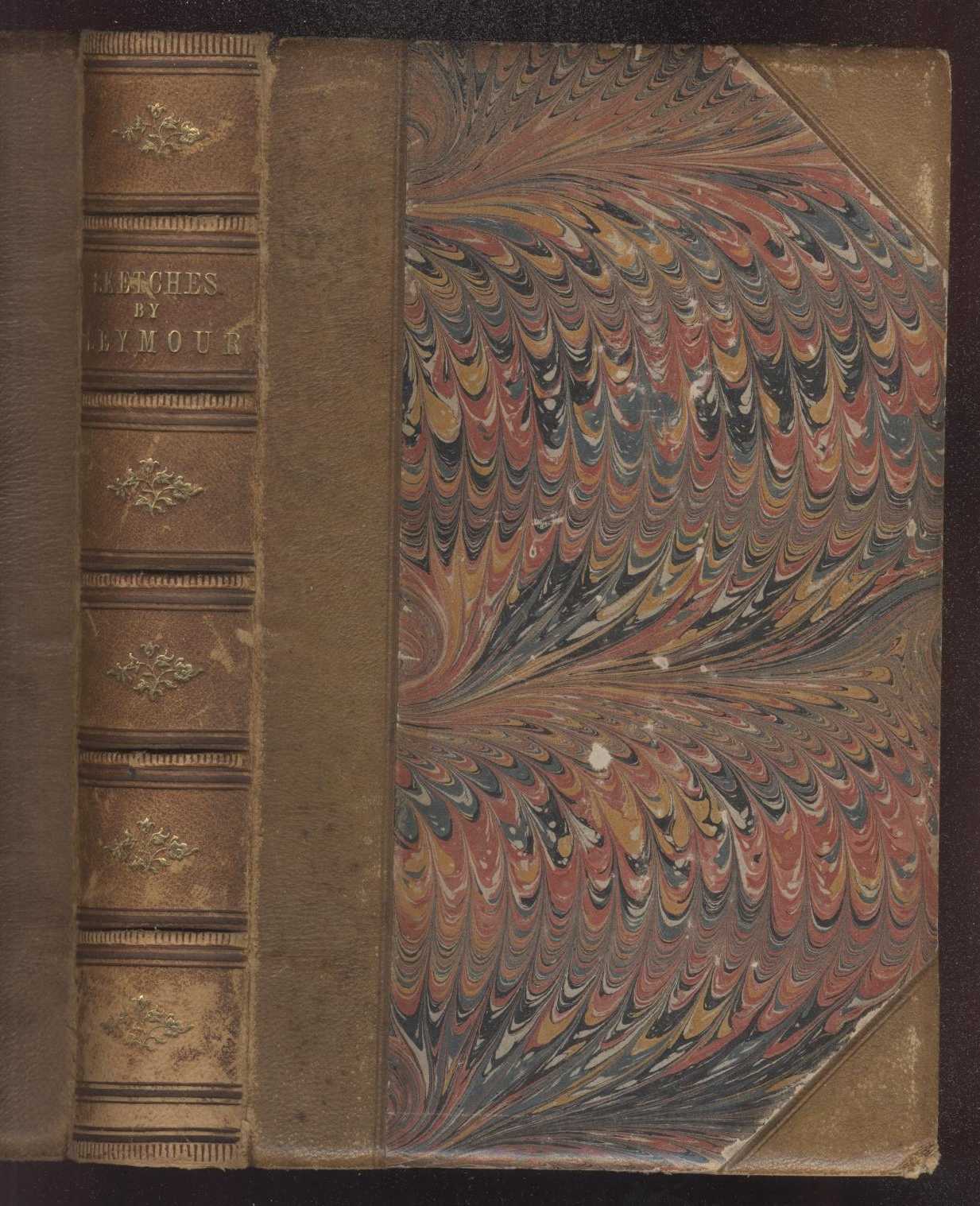
The Project Gutenberg EBook of The Sketches of Seymour (Illustrated), Part 4., by Robert Seymour This eBook is for the use of anyone anywhere at no cost and with almost no restrictions whatsoever. You may copy it, give it away or re-use it under the terms of the Project Gutenberg License included with this eBook or online at www.gutenberg.net Title: The Sketches of Seymour (Illustrated), Part 4. Author: Robert Seymour Release Date: July 12, 2004 [EBook #5648] Language: English Character set encoding: ISO-8859-1 *** START OF THIS PROJECT GUTENBERG EBOOK SKETCHES OF SEYMOUR *** Produced by David Widger

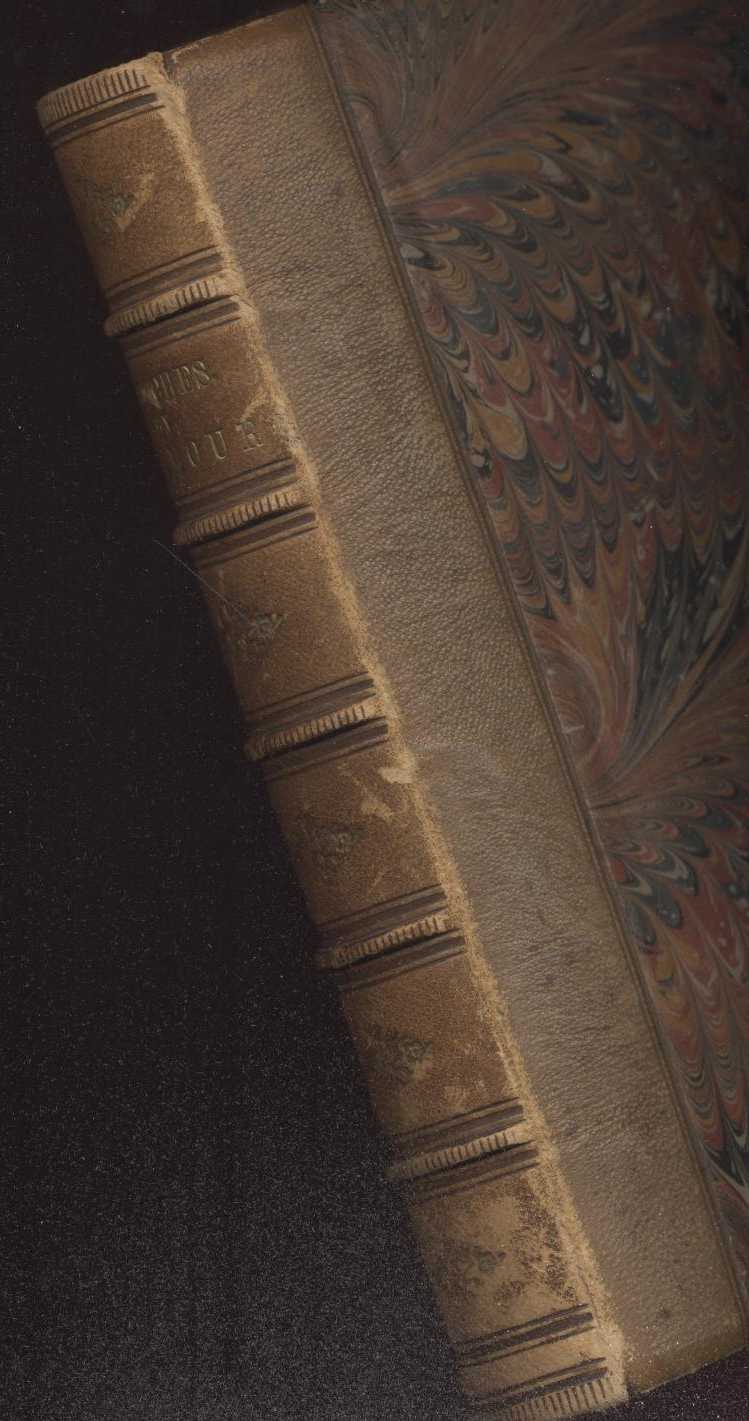
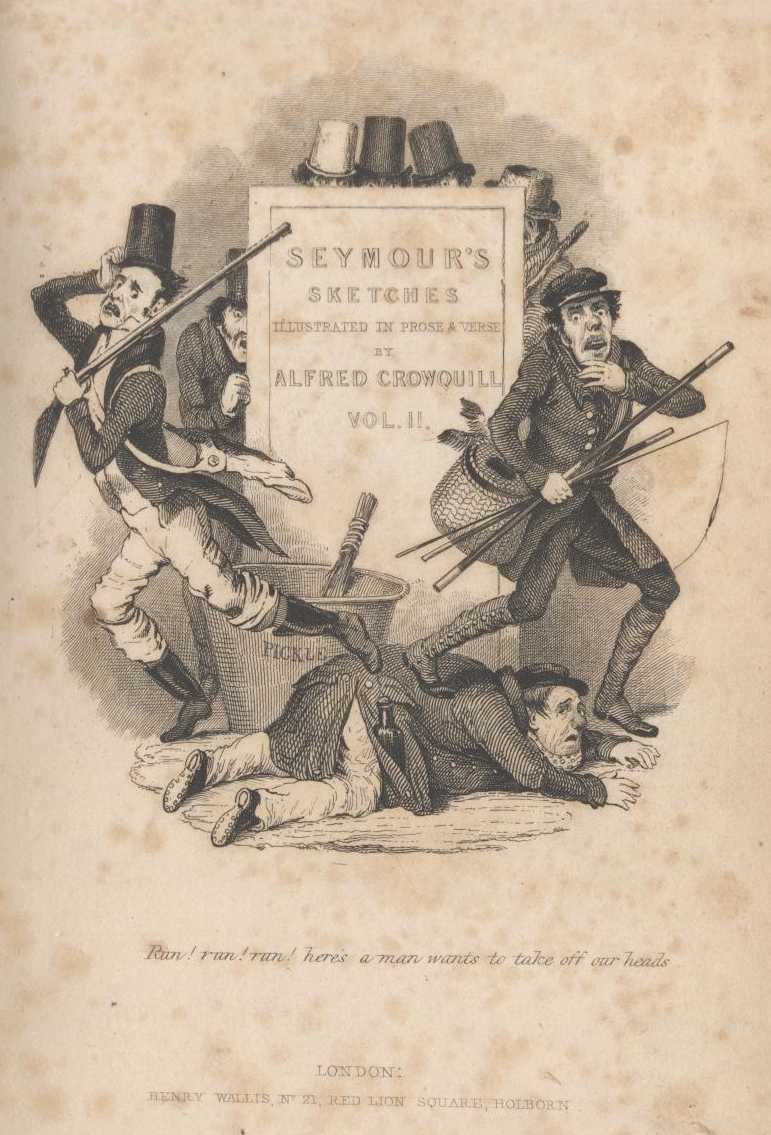
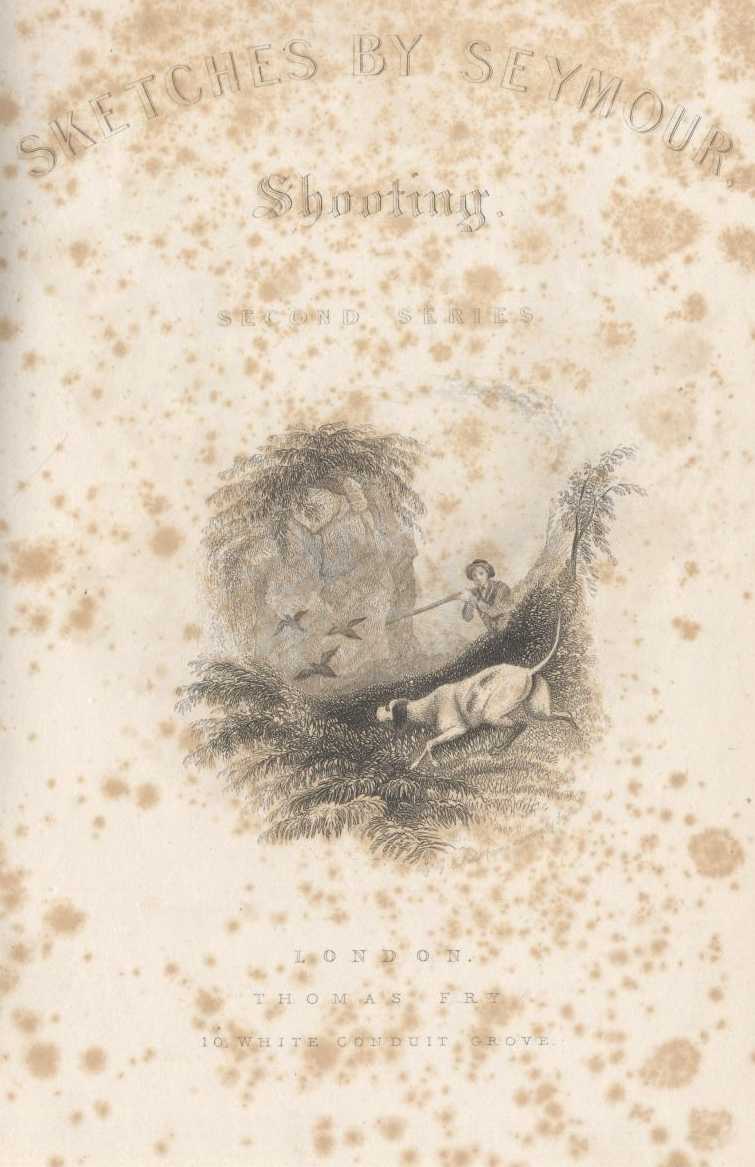
EBOOK EDITOR'S INTRODUCTION:
"Sketches by Seymour" was published in various versions about 1836. The copy used for this PG edition has no date and was published by Thomas Fry, London. Some of the 90 plates note only Seymour's name, many are inscribed "Engravings by H. Wallis from sketches by Seymour." The printed book appears to be a compilation of five smaller volumes. From the confused chapter titles the reader may well suspect the printer mixed up the order of the chapters. The complete book in this digital edition is split into five smaller volumes—the individual volumes are of more manageable size than the 7mb complete version.
The importance of this collection is in the engravings. The text is often mundane, is full of conundrums and puns popular in the early 1800's—and is mercifully short. No author is given credit for the text though the section titled, "The Autobiography of Andrew Mullins" may give us at least his pen-name.
DW
| FRONTPIECE II. | SHOOTING |
| TITLE PAGE II. | VOLUME II. |
| PLATE XIII. | [WATTY WILLIAMS AND BULL] |
| PLATE XIV. | DELICACY! |
| PLATE XV. | Now, Jem, let's shew these gals how we can row |
| PLATE XVI. | STEAMING IT TO MARGATE. |
| PLATE XVII. | PETER SIMPLE'S FOREIGN ADVENTURE. No. I. |
| PLATE XVIII. | PETER SIMPLE'S FOREIGN ADVENTURE. No. II. |
| PLATE XIX. | DOBBS'S "DUCK."—A LEGEND OF HORSELYDOWN. |
| PLATE XX. | STRAWBERRIES AND CREAM. |
| PLATE XXI. | A DAY'S PLEASURE. No. I.—THE JOURNEY OUT. |
| PLATE XXII. | A DAY'S PLEASURE. No. II.—THE JOURNEY HOME. |
| PLATE XXIII. | [HAMMERING] Beside a meandering stream |
| PLATE XXIV. | PRACTICE. |
| PLATE XXV. | PRECEPT. |
| PLATE XXVI. | EXAMPLE. |
| PLATE XXVII. | A MUSICAL FESTIVAL. |
| PLATE XXVIII. | THE EATING HOUSE. |
| PLATE XXIX. | [SCENE X.(b)] This is a werry lonely spot, Sir |
| PLATE XXX. | GONE! |
| PLATE XXXI. | THE PRACTICAL JOKER. No. I. |
| PLATE XXXII. | THE PRACTICAL JOKER. No. II. |
| PLATE XXXIII. | FISHING FOR WHITING AT MARGATE. |
"He sat, like patience on a monument, smiling at grief."
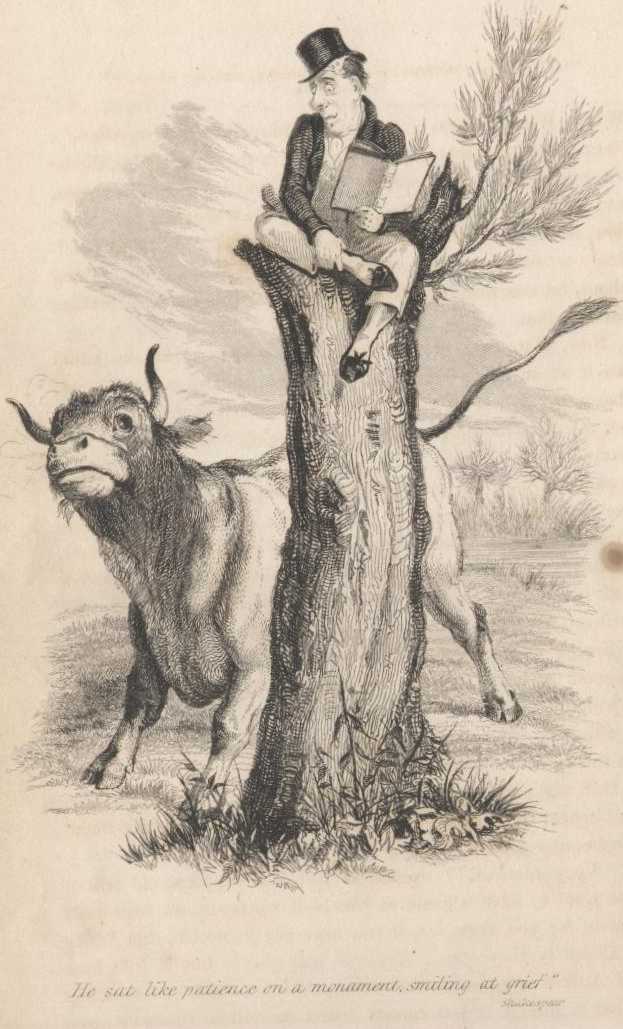
WATTY WILLIAMS was a studious youth, with a long nose and a short pair of trowsers; his delight was in the green fields, for he was one of those philosophers who can find sermons in stones, and good in everything. One day, while wandering in a meadow, lost in the perusal of Zimmerman on Solitude, he was suddenly aroused from his reverie by a loud "Moo!" and, turning about, he descried, to his dismay, a curly-fronted bull making towards him.
Now, Watt., was so good-humoured a fellow, that he could laugh at an Irish bull, and withal, so staunch a Protestant, that a papal bull only excited a feeling of pity and contempt; but a bull of the breed which was careering towards him in such lively bounds, alarmed him beyond all bounds; and he forthwith scampered over the meadow from the pugnaceous animal with the most agile precipitation imaginable; for he was not one of those stout-hearted heroes who could take the bull by the horns—especially as the animal appeared inclined to contest the meadow with him; and though so fond of beef (as he naturally was), he declined a round upon the present occasion.
Seeing no prospect of escape by leaping stile or hedge, he hopped the green turf like an encaged lark, and happily reached a pollard in the midst of the meadow.
Climbing up with the agility of a squirrel, he seated himself on the knobby summit of the stunted willow.
Still retaining his Zimmerman and his senses, he looked down and beheld the corniferous quadruped gamboling playfully round his singular asylum.
"Very pleasant!" exclaimed he; "I suppose, old fellow you want to have a game at toss!—if so, try it on with your equals, for you must see, if you have any gumption, that Watty Williams is above you. Aye, you may roar!—but if I sit here till Aurora appears in the east, you won't catch me winking. What a pity it is you cannot reflect as well as ruminate; you would spare yourself a great deal of trouble, and me a little fright and inconvenience."
The animal disdainfully tossed his head, and ran at the tree—and
"Away flew the light bark!"
in splinters, but the trunk remained unmoved.
"Shoo! shoo!" cried Watty, contemptuously; but he found that shoo'ing horns was useless; the beast still butted furiously against the harmless pollard.
"Hallo!" cried he to a dirty boy peeping at a distance—"Hallo!" but the lad only looked round, and vanished in an instant.
"The little fool's alarmed, I do believe!" said he; "He's only a cow-boy, I dare say!" And with this sapient, but unsatisfactory conclusion, he opened his book, and read aloud, to keep up his courage.
The bull hearing his voice, looked up with a most melancholy leer, the corners of his mouth drawn down with an expression of pathetic gravity.
Luckily for Watty, the little boy had given information of his dilemma, and the farmer to whom the bull belonged came with some of his men, and rescued him from his perilous situation.
"The gentleman will stand something to drink, I hope?" said one of the men.
"Certainly" said Watty.
"That's no more than right," said the farmer, "for, according to the New Police Act, we could fine you."
"What for?"
"Why, we could all swear that when we found you, you were so elevated you could not walk!"
Hereupon his deliverers set up a hearty laugh.
Watty gave them half-a-crown; saying, with mock gravity—
"I was on a tree, and you took me off—that was kind! I was in a
fright, and you laughed at me; that was uncharitable. Farewell!"
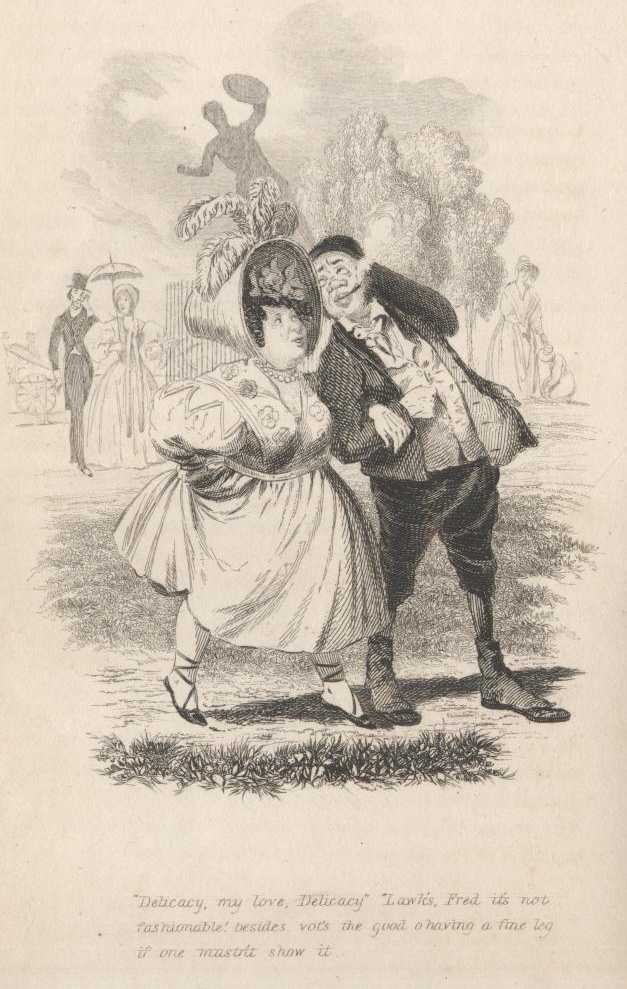
LOUNGING in Hyde Park with the facetious B____, all on a summer's day, just at that period when it was the fashion to rail against the beautiful statue, erected by the ladies of England, in honour of the Great Captain—
"The hero of a hundred fights,"—
"How proudly must he look from the windows of Apsley House," said I, "upon this tribute to his military achievements."
"No doubt," replied B____;" and with all that enthusiasm with which one man of mettle ever regards another! At the same time, how lightly must he hold the estimation of the gallant sons of Britain, when he reflects that he has been compelled to guard his laurelled brow from the random bullets of a democratic mob, by shot-proof blinds to his noble mansion: this was:
'The unkindest cut of all,'
after all his hair-breadth 'scapes, by flood and field, in the service. of his country, to be compelled to fortify his castle against domestic foes."
"A mere passing cloud, that can leave no lasting impression on his great mind," said I; "while this statue will for ever remain, a memorial of his great deeds; and yet the complaint is general that the statue is indelicate—as if, forsooth, this was the first statue exhibited in 'puris naturalibus' in England. I really regard it as the senseless cavilling of envious minds."
"True," said B____, laughing; "there is a great deal of railing about the figure, but we can all see through it!" at the same time thrusting his walking-stick through the iron-fence that surrounds the pedestal. As for delicacy, it is a word that is used so indiscriminately, and has so many significations, according to the mode, that few people rightly understand its true meaning. We say, for instance, a delicate child; and pork-butchers recommend a delicate pig! Delicacy and indelicacy depend on the mind of the recipient, and is not so much in the object as the observer, rely on't. Some men have a natural aptitude in discovering the indelicate, both in words and figures they appear, in a manner, to seek for it. I assure you that. I (you may laugh if you will) have often been put to the blush by the repetition of some harmless phrase, dropped innocently from my lips, and warped by one of these 'delicate' gentlemen to a meaning the very reverse of what I intended to convey. Like men with green spectacles, they look upon every object through an artificial medium, and give it a colour that has no existence in itself!
It was only last week, I was loitering about this very spot, when I observed, among the crowd of gazers, a dustman dressed in his best, and his plump doxy, extravagantly bedizened in her holiday clothes, hanging on his arm.
As they turned away, the lady elevated the hem of her rather short garments a shade too high (as the delicate dustman imagined) above her ancle. He turned towards her, and, in an audible whisper, said, 'Delicacy, my love—'delicacy!'—'Lawks, Fred!' replied the damsel, with a loud guffaw,'—'it's not fashionable!—besides, vot's the good o' having a fine leg, if one must'nt show it?'
So much for opinions on delicacy!
"Now, Jem, let's shew these gals how we can row."
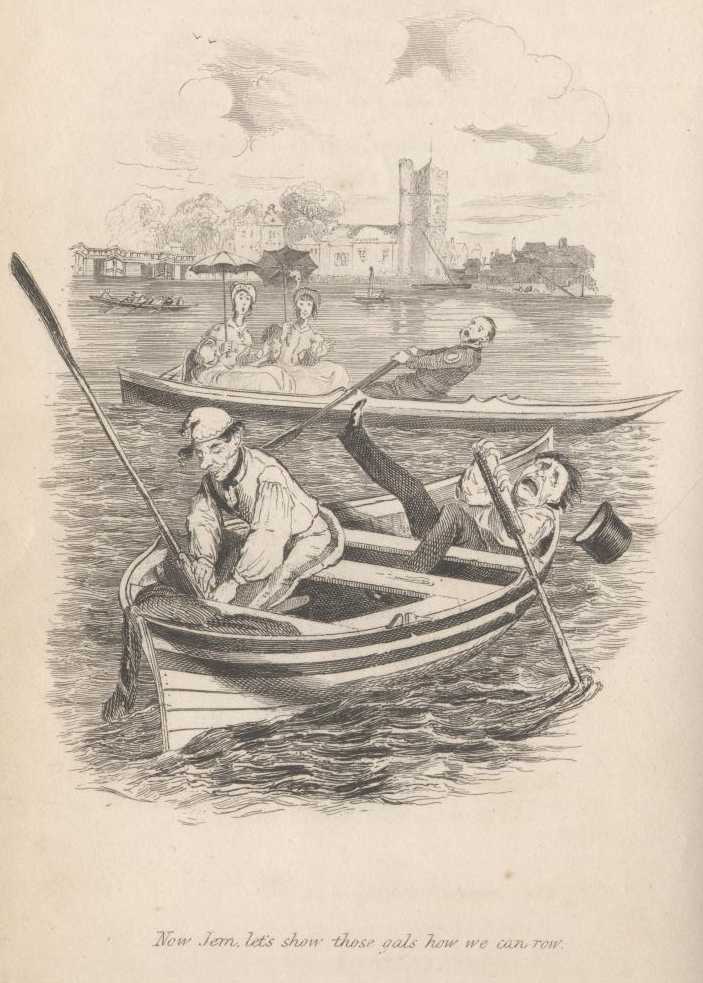
|
THE tide is agin us, I know, But pull away, Jem, like a trump; Vot's that? O! my vig, it's a barge— Oh! criky! but that vos a bump! How lucky 'twas full o' round coals, Or ve might ha' capsized her—perhaps! See, the bargemen are grinning, by goles! I never seed sich wulgar chaps. Come, pull away, Jem, like a man, A vherry's a coming along Vith a couple o' gals all agog— So let us be first in the throng. Now put your scull rig'ler in, Don't go for to make any crabs; But feather your oar, like a nob, And show 'em ve're nothink but dabs! The vaterman's leering at us, And the gals is a giggling so— They take us for green'uns, but ve Vill soon show 'em how ve can row. Alas! for poor Bobby's "show off"— He slipp'd in a trice from his seat— While his beaver fell into the stream, And the gals laugh'd aloud at his feat. For his boots were alone to be seen, As he sprawled like a crab on its back; While the waterman cried—"Ho! my lads! I think you'd best try t'other tack!" Says Bobby—"You fool, it's your fault; Look—my best Sunday castor is vet: Pull ashore, then, as fast as you can. I can't row no more—I'm upset. "I think that my napper is broke, Abumpin' agin this wile boat; You may laugh—but I think it's no joke: And I shan't soon agin be afloat. "I'll never take you out agin— I've had quite enough in this bout!" Cried Jem—"Don't be angry vith me; Sit still, and I'll soon—PUT YOU OUT!" |
"Steward, bring me a glass of brandy as quick as you can."
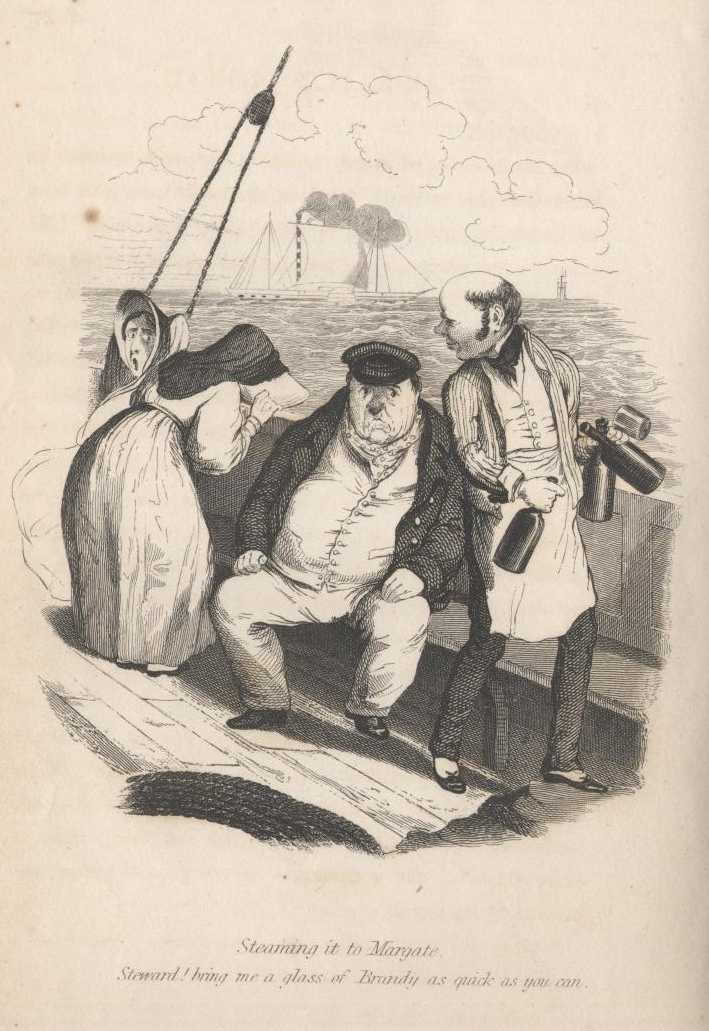
SINCE the invention of steam, thousands have been tempted to inhale the saline salubrity of the sea, that would never have been induced to try, and be tried, by the experiment of a trip. Like hams for the market, every body is now regularly salted and smoked. The process, too, is so cheap! The accommodations are so elegant, and the sailors so smart! None of the rolling roughness of quid-chewing Jack-tars. Jack-tars! pshaw! they are regular smoke jacks on board a steamer! The Steward ("waiter" by half the cockneys called) is so ready and obliging; and then the provisions is excellent. Who would not take a trip to Margate? There's only one thing that rather adulterates the felicity—a drop of gall in the cup of mead!—and that is the horrid sea-sickness! learnedly called nostalgia; but call it by any name you please, like a stray dog, it is pretty sure to come.
The cold perspiration—the internal commotion—the brain's giddiness—the utter prostration of strength—the Oh! I never shall forget the death-like feel!—Fat men rolling on the deck, like fresh caught porpoises; little children floundering about; and white muslins and parasols vanishing below! The smoking-hot dinner sends up its fumes, and makes the sick more sick. Soda-water corks are popping and flying about in every direction, like a miniature battery pointed against the assaults of the horrid enemy!
"Steward!" faintly cries a fat bilious man, "bring me a glass of brandy as quick as you can."
But alas! he who can thus readily summon spirits from the vasty deep, has no power over the rolling sea, or its reaches!
"O! my poor pa!" exclaims the interesting Wilhelmina; and is so overcome, that she, sweet sympathizer! is soon below pa in the ladies' cabin. In fact, the greater part of the pleasure-seekers are taken—at full length.
Even young ladies from boarding-school, who are thinking of husbands, declare loudly against maritime delight! while all the single young men appear double.
The pier at last appears—and the cargo of drooping souls hail it with delight, and with as grateful a reverence as if they were received by the greatest peer of the realm!
They hurry from the boat as if 'twere Charon's, and they were about stepping into the fields of Elysium!
A change comes o'er the spirit of their dream—their nerves are
braced; and so soon are mortal troubles obliterated from the mind, that
in a few days they are ready again to tempt the terrors of sea-sickness
in a voyage homewards—notwithstanding many of them, in their extremity,
had vowed that they never would return by water, if they outlived the
present infliction; considering, naturally enough, that it was "all up"
with them!
"Loud roared the dreadful thunder."—Bay of Biscay.
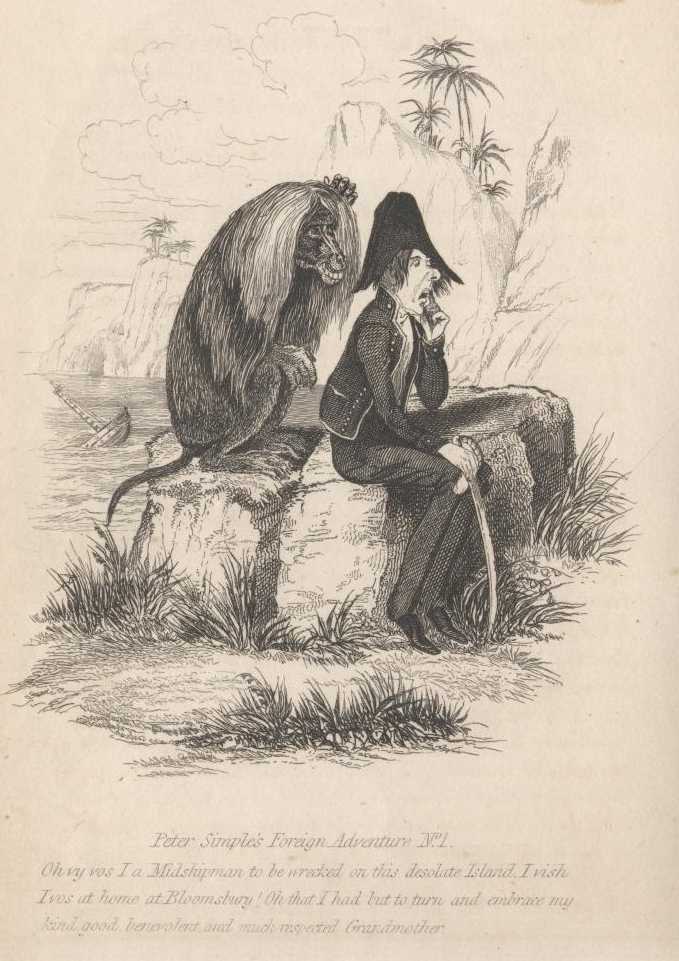
THE good ship Firefly tossed and tumbled on the mountainous waves of the stormy sea, like a cork in a gutter; and when she could not stem the waves, politically tried a little tergiversation, and went stern foremost! The boatswain piped all hands, and poor Peter Simple piped his eye; for the cry of the whole crew was, that they were all going to Davy Jones's locker. The waves struck her so repeatedly, that at last she appeared as ungovernable as a scold in a rage; and as she found she could not, by any means, strike the storm in the wind, and so silence it, she gave vent to her fury by striking upon a rock!
It was a hard alternative truly; but what could she do? The long boat was soon alongside, and was not long before it was filled with tars and salt-water. Alas! she was speedily swamped, and the crew were compelled to swim for their lives. Peter, however, could not swim, but the sea gave him a lift in his dilemma, and washed him clean ashore, where he lay for some time like a veritable lump of salt-Peter! When the storm had abated he came to himself, and of course found himself in no agreeable company!
Sticking his cocked-hat on his head, and grasping his dirk in his hand, he tottered to a rock, when, seating himself, he philosophically rocked to and fro. "Oh! vy vos I a midshipman," cried he, "to be wrecked on this desolate island? I vish I vos at home at Bloomsbury! Oh! that I had but to turn and embrace my kind, good, benevolent, and much respected grandmother." As he uttered this pathetic plaint, he heard a chatter—of which, at first considering that it proceeded from his own teeth, he took no notice—but the sounds being repeated, he turned his head, and beheld a huge baboon with a dog-face and flowing hair, grinning with admiration at his cocked hat.
One look was sufficient! he leaped from his seat, and rushed wildly forward, threading a wood in his way, and turning in and out—in and out—with the sharpness and facility of a needle in the heel of a worsted stocking—he never stayed his flight, 'till he fell plump into the centre of a group of Indians, who received him with a yell!—loud enough to split the drums of a whole drawing-room full of ears polite.
He would have fallen headlong with fear and exhaustion upon the turf, had not a gentle female caught the slender youth in her arms, and embraced him with all the energetic affection of a boa-constrictor.
Peter trembled like a little inoffensive mouse in the claws of a tabby!
At the same time one of the Indians stepped forward, brandishing his scalping knife.
He was the very prototype of an animated bronze Hercules; and, seizing
the poor middy's lank locks, with a peculiar twist, in his iron grasp—
Peter fainted!
"O! what a lost mutton am I!"—Inkle and Yarico.
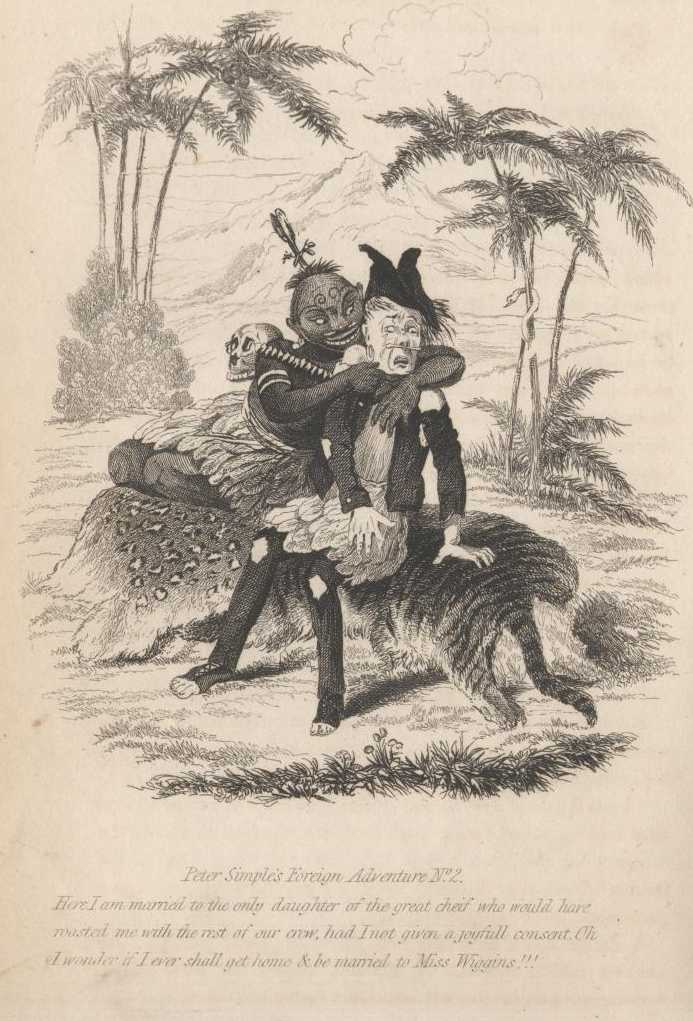
MOST luckily for poor Peter was it, that he fell into the hands, or rather the arms, of the Indian maid; for she not only preserved his crop, but his life. When he recovered from his swoon, he found himself seated beside his preserver, who, with one arm round his waist, was holding a cocoa-nut, filled with a refreshing beverage, to his parched and pallid lips. A large fire blazed in the middle of the wide space occupied by the Indians, and he beheld the well-known coats and jackets of the brave crew of the Firefly scattered on the greensward.
His heart palpitated-he thought at first that the villainous Indians had stripped them, and left them to wander in a state of nature through the tangled and briery woods. He was, however, soon—too soon—convinced that the savages had dressed them! Yes, that merry crew—who had so often roasted him—had been roasted by the Indians!
From this awful fate the lovely Ootanga had preserved him. She had suddenly conceived a violent affection for the young white-face; and, after a long harangue to the chief, her father, his consent was obtained, and the nuptials were celebrated.
"I smell a rat," said Peter—"I'm booked; but better booked than cooked, at any rate;" and forthwith returned thanks to the company for the honour they had conferred upon him, in the fashion of an after-dinner speech, accompanied with as much pantomime as he could manage.
A dance and a feast followed, of which Peter partook; but whether rabbit, squirrel, or monkey, formed the basis of his wedding-supper, he was not naturalist enough to determine.
Ootanga's affection, however, was sufficient to make amends for anything; she was, in truth, a most killing beauty, for she brought him tigers slain by her own hands, and made a couch for him of the skins.
She caught rattlesnakes for him, and spitch-cooked them for his breakfast. In fact, there was nothing she left undone to convince him of her unbounded love.
Peter's heart, however, was untouched by all this show of tenderness; for the fact is, he had already given his heart to a white-face in his own country.
The only consolation he had in his forlorn situation was to talk of her continually; and, as Ootanga understood not a syllable of what he uttered, she naturally applied all his tender effusions to herself, and laughed and grinned, and showed her white teeth, as if she would devour her little husband.
Seated on a tiger skin, with his lawful spouse beside him, arrayed in shells, bows, feathers, and all the adornments of a savage bride, he still sighed for home, and plaintively exclaimed:—
"Here I am, married to the only daughter of the great chief, who would have roasted me with the rest of our crew, had I not given a joyful consent. Oh! I wonder if I ever shall get home, and be married to Miss Wiggins!!!"
The lovely wide-mouthed Ootanga patted him fondly on the chin, and
dreamed in her ignorance that he was paying her a compliment in his
native language.
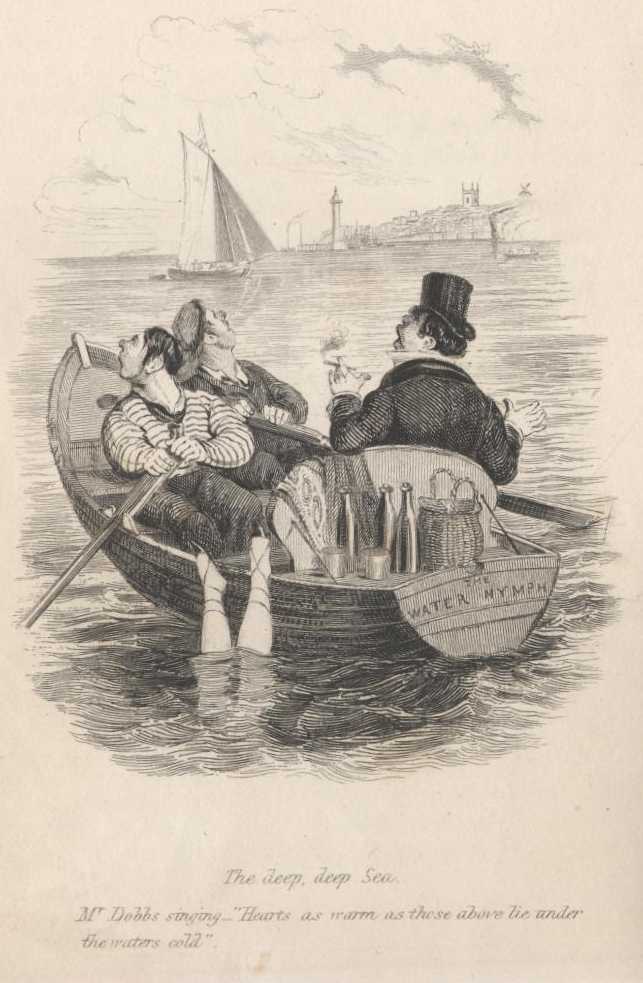
IT may be accepted as an indubitable truth, that when the tenderest epithets are bandied between a married couple, that the domestic affairs do not go particularly straight.
Dobbs and his rib were perhaps the most divided pair that ever were yoked by Hymen. D. was a good-humored fellow, a jovial blade, full of high spirits—while his wife was one of the most cross-grained and cantankerous bodies that ever man was blessed with—and yet, to hear the sweet diminutives which they both employed in their dialogues, the world would have concluded that they were upon the best terms conceivable.
"My love," quoth Mrs. D., "I really now should like to take a boat and row down the river as far as Battersea; the weather is so very fine, and you know, my dear love, how fond I am of the water."
D. could have added (and indeed it was upon the very tip of his tongue)—"mixed with spirits"—but he wisely restrained the impertinent allusion.
"Well, my duck," said he, "you have only to name the day, you know, I am always ready to please,"—and then, as was his habit, concluded his gracious speech by singing—
|
"'Tis woman vot seduces all mankind—
Their mother's teach them the wheedling art." |
"Hold your nonsense, do," replied Mrs. D____, scarcely able to restrain her snappish humour, but, fearful of losing the jaunt, politically added, "Suppose, love, we go to-day—no time like the present, dear."
"Thine am I—thine am I," sang the indulgent husband.
And Mrs. D____ hereupon ordered the boy to carry down to the stairs a cargo of brandy, porter, and sandwiches, for the intended voyage, and taking her dear love in the humour, presently appeared duly decked out for the trip.
Two watermen and a wherry were soon obtained, and Dobbs, lighting his cigar, alternately smoked and sang, while his duck employed herself most agreeably upon the sandwiches.
The day was bright and sunny, and exceedingly hot; and they had scarcely rowed as far as the Red-House, when Mrs. D____became rather misty, from the imbibation of the copious draughts she had swallowed to quench her thirst.
A lighter being a-head, the boatmen turned round, while Dobbs, casting up his eyes to the blue heavens, was singing, in the hilarity of his heart, "Hearts as warm as those above, lie under the waters cold," when the boat heeled, and his duck, who unfortunately could not swim, slipped gently over the gunwhale, and, unnoticed, sank to rise no more.
"Ah!" said Dobbs, when, some months afterwards, he was speaking of the
sad bereavement, "She was a wife! I shall never get such another, and,
what's more, I would not if I could."
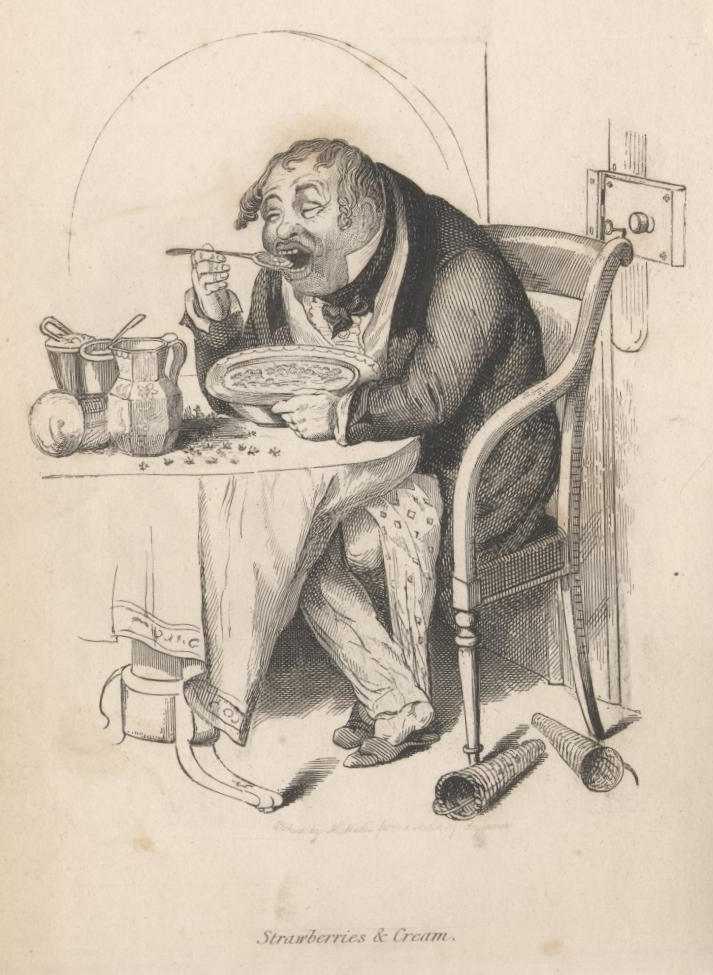
Among all the extraordinary and fantastic dishes compounded for the palate of Heliogabalus, the Prince of Epicures, that delicious admixture of the animal and the vegetable—Strawberries and Cream—is never mentioned in the pages of the veracious chronicler of his gastronomic feats!
Yes! 'tis a lamentable truth, this smooth, oleaginous, and delicately odorous employment for the silver spoon, was unknown. Should the knowledge of his loss reach him in the fields of Elysium, will not his steps be incontinently turned towards the borders of the Styx—his plaintive voice hail the grim ferryman, while in his most persuasive tones he cries—
"Row me back—row me back,"
that he may enjoy, for a brief space, this untasted pleasure? Ye gods! in our mind's eye we behold the heartless and unfeeling Charon refuse his earnest prayer, and see his languid spirit—diluted by disappointment to insipidity—wandering over the enamelled meads, as flat and shallow as an overflow in the dank fens of Lincoln.
His imagination gloats upon the fragrant invention, and he gulps at the cheating shadow until Elysium becomes a perfect Hades to his tortured spirit.
Mellow, rich, and toothsome compound! Toothsome did we say? Nay, even those who have lost their 'molares, incisores,' canine teeth, 'dentes sapientiae,' and all can masticate and inwardly digest thee!
Racy and recherche relish!
Thou art—
|
As delicate as first love— As white and red as a maiden's cheek— As palateable as well-timed flattery— As light and filling as the gas of a balloon— As smooth as a courtier— As odorous as the flowers of Jasmin— As soft as flos silk— As encouraging, without being so illusory, as Hope— As tempting as green herbage to lean kine— —————— a Chancery suit to the Bill of a cormorant-lawyer— —————— a pump to a thirsty paviour— —————— a sun-flower to a bee— —————— a ripe melon to a fruit-knife— —————— a rose to a nightingale—or —————— a pot of treacle to a blue-bottle— As beautiful to the eye as a page of virgin-vellum richly illuminated And As satisfactory as a fat legacy! |
Talk of nectar! if Jupiter should really wish to give a bonne-bouche
to Juno, Leda, or Venus, or any one of his thousand and one flames, let
him skim the milky-way—transform the instrumental part of the music of
the spheres into 'hautboys,' and compound the only dish worth the roseate
lips of the gentle dames 'in nubibus,' and depend on it, the cups of
Ganymede and Hebe will be rejected for a bowl of—Strawberries and Cream.
"It's werry hot, but werry pleasant."
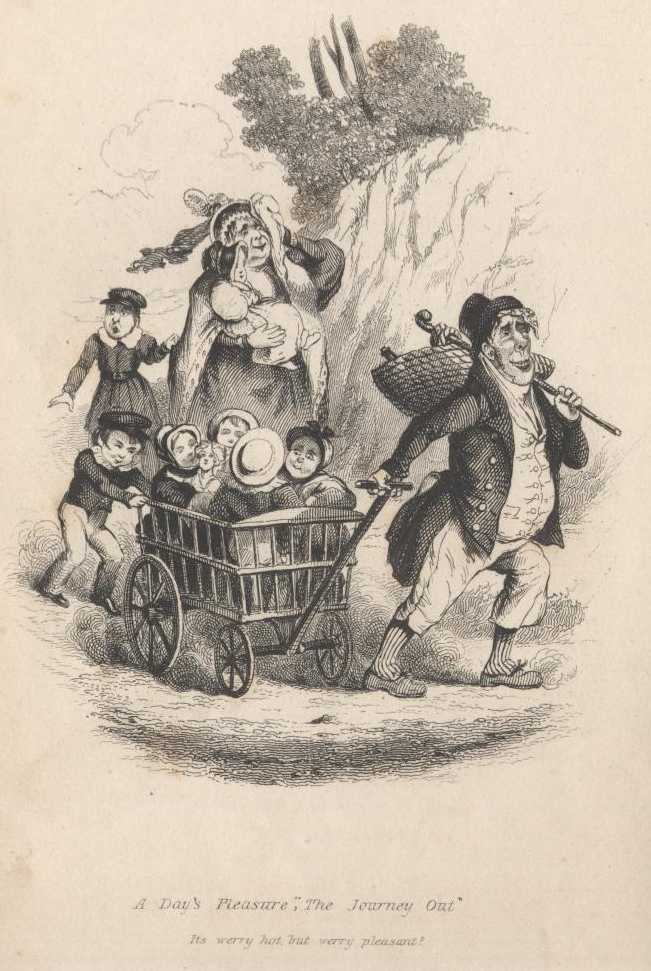
|
SAYS Mrs. Sibson to her spouse "The days is hot and fair; I think 'twould do the children good To get a little hair! "For ve've been moping here at home And nothin' seen o' life; Vhile neighbor Jones he takes his jaunts O' Sundays vith his vife!" "Vell! vell! my dear," quoth Mr. S____ "Let's hear vot you purpose; I'm al'ays ready to comply, As you, my love, vell knows. "I'll make no bones about the cost; You knows I never stick About a trifle to amuse, So, dearest Pol, be quick." "Vhy, this is it:—I think ve might To Hornsey have a day; Maria, Peg, and Sal, and Bet Ve'd pack into a 'chay.' "Our Jim and Harry both could valk, (God bless their little feet!) The babby in my arms I'd take— I'm sure 'twould be a treat;" Quoth he: "I am unanimous!" And so the day was fix'd; And forth they started in good trim, Tho' not with toil umnix'd. Across his shoulders Sibson bore A basket with the "grub," And to the "chay" perform'd the "horse," Lest Mrs. S____ should snub. Apollo smiled!—that is, the sun Blazed in a cloudless sky, And Sibson soon was in a "broil" By dragging of his "fry." Says S____, "My love, I'm dry as dust!" When she replied, quite gay, "Then, drink; for see I've bottled up My spirits for the day." And from the basket drew a flask, And eke a footless glass; He quaff'd the drink, and cried, "Now, dear, I'm strong as ____" let that pass! At last they reach'd the destined spot And prop and babes unpacked; They ran about, and stuff'd, and cramm'd, And really nothing lack'd. And Sibson, as he "blew a cloud," Declared, "It vos a day!" And vow'd that he would come again— Then call'd for "Vot's to pay?" |
"Vot a soaking ve shall get."
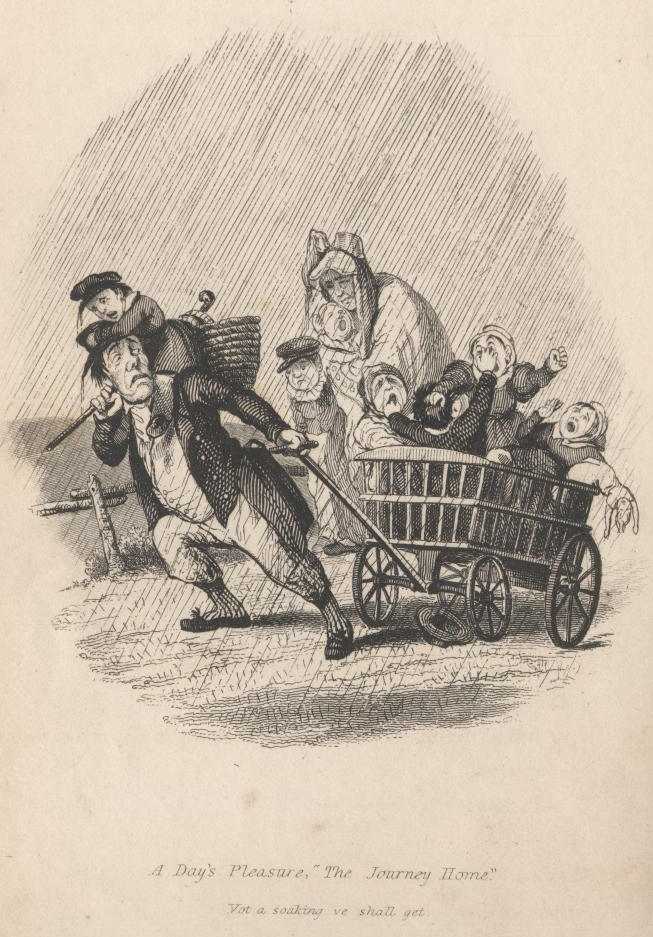
|
ACROSS the fields they homeward trudged, when, lo! a heavy rain Came pouring from the sky; Poor Sibson haul'd, the children squall'd; alas! it was too plain They would not reach home dry. With clay-clogg'd wheels, and muddy heels, and Jim upon his back, He grumbled on his way; "Vell, blow my vig! this is a rig!" cried Sibson, "Vell! alack! I shan't forget this day! "My shoes is sop, my head's a mop; I'm vet as any think; Oh! shan't ve cotch a cold!" "Your tongue is glib enough!" his rib exclaim'd, and made him shrink, —For she was such a scold— And in her eye he could descry a spark that well he knew Into a flame would rise; So he was dumb, silent and glum, as the small "chay" he drew, And ventured no replies. Slip, slop, and slush! past hedge and bush, the dripping mortals go (Tho' 'twas "no go" S____ thought); "If this 'ere's fun, vy I for vuu," cried he, with face of woe, "Von't soon again be caught. "Vet to the skin, thro' thick and thin, to trapes ain't to my mind; So the next holiday I vill not roam, but stick at home, for there at least I'll find The means to soak my clay. "Tis quite a fag, this 'chay' to drag—the babbies too is cross, And Mrs. S____ is riled. 'Tis quite a bore; the task is more—more fitt'rer for an horse; And vith the heat I'm briled! "No, jaunts adoo! I'll none o' you!"—and soon they reach'd their home, Wet through and discontent— "Sure sich a day, I needs must say," exclaim'd his loving spouse, "Afore I never spent!" |
"Beside a meandering stream
There sat an old gentleman fat;
On the top of his head was his wig,
On the top of his wig was his hat."
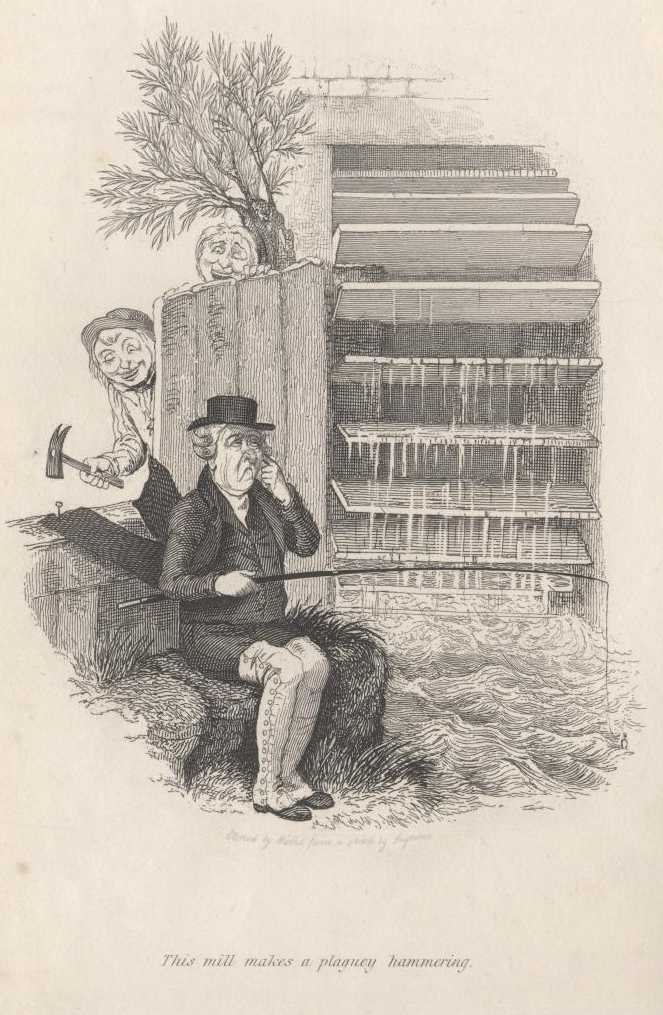
I ONCE followed a venerable gentleman along the banks of a mill-stream, armed at all points with piscatorial paraphernalia, looking out for some appropriate spot, with all the coolness of a Spanish inquisitor, displaying his various instruments of refined torture. He at last perched himself near the troubled waters, close to the huge revolving wheel, and threw in his float, which danced upon the mimic waves, and bobbed up and down, as if preparing for a reel. Patiently he sat; as motionless and unfeeling as a block. I placed myself under cover of an adjoining hedge, and watched him for the space of half an hour; but he pulled up nothing but his baited hook;—what his bait was, I know not; but I suppose, from the vicinity, he was fishing for a "miller's thumb." Presently, two mealy-mouthed men, from the mill, made their appearance, cautiously creeping behind him.
I drew myself up in the shadow of the luxuriant quickset to observe their notions.
A paling in the rear offered the rogues an effectual concealment in case the angler should turn.
Close to his seat ran some wood-work, upon which they quietly drew the broad tails of his coat, and driving in a couple of tenpenny nails, left the unconscious old gentleman a perfect fixture; to be taken at a valuation, I suppose, part of his personal property being already "brought to the hammer!" the clattering clamour of the wheel precluding him from hearing the careful, but no less effectual taps. I certainly enjoyed the trick, and longed to see the ridiculous issue; but he was so intent upon his sport—so fixed that he did not discover the nature of his real attachment while I remained.
Doubtless if he were of a quick and sudden temperament, a snatch of his humour rent his broad cloth, and he returned home with a woful tail, and slept not—for his nap was irreparably destroyed!
I hate all twaddle; but when I see an old fool, with rod and line,
"Sitting like patience on a monument,"
and selling the remnant of his life below cost price in the pursuit of angling,—that "art of ingeniously tormenting,"—a feeling,
"More in sorrow than in anger,"
is excited at his profitless inhumanity.
Vainly do all the disciples of honest Izaak Walton discourse, in eulogistic strains, of the pleasure of the sport. I can imagine neither pleasure nor sport derivable from the infliction of pain upon the meanest thing endowed with life.
This may be deemed Brahminical, but I doubt that man's humanity who can indulge in the cruel recreation and murder while he smiles.
"What, heretical sentiments," exclaims some brother of the angle,
(now I am an angle, but no angler.) "This fellow hath never trudged at
early dawn along the verdant banks of the 'sedgy lea,' and drunk in the
dewy freshness of the morning air. His lines have never fallen in
pleasant places. He has never performed a pilgrimage to Waltham Cross.
He is, in truth, one of those vulgar minds who take more delight in the
simple than the—gentle!—and every line of his deserves a rod!"
"Sweet is the breath of morn when she ascends
With charm of earliest birds."—-MILTON.
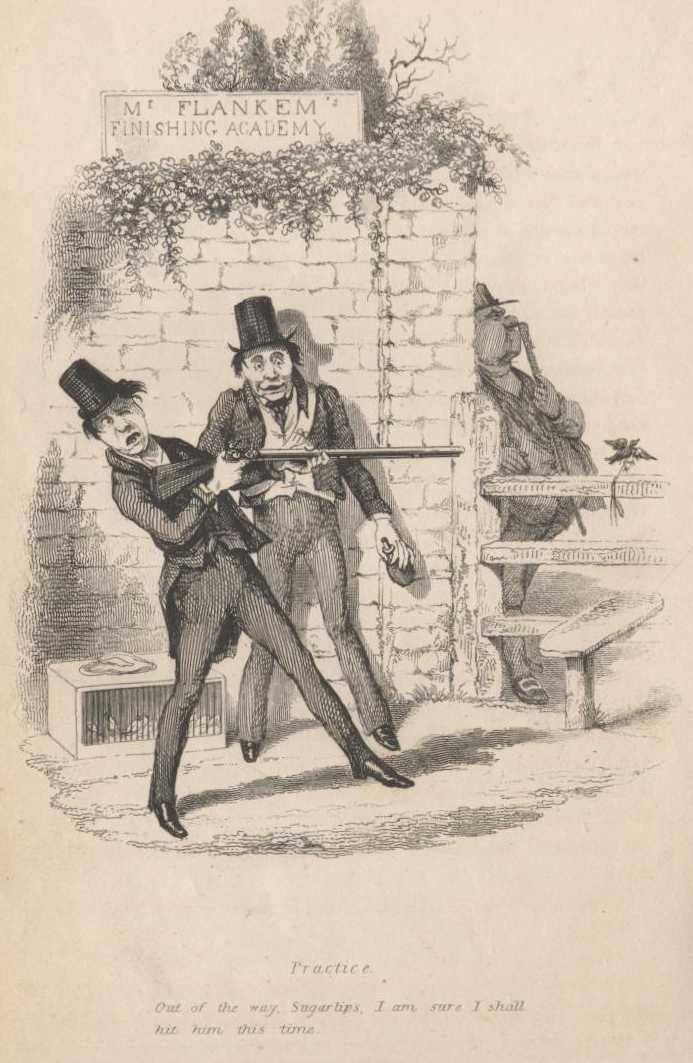
"WELL, this is a morning!" emphatically exclaimed a stripling, with a mouth and eyes formed by Nature of that peculiar width and power of distension, so admirably calculated for the expression of stupid wonder or surprise; while his companion, elevating his nasal organ and projecting his chin, sniffed the fresh morning breeze, as they trudged through the dewy meadows, and declared that it was exactly for all the world similar-like to reading Thomson's Seasons! In which apt and appropriate simile the other concurred.
"Tom's a good fellow to lend us his gun," continued he—"I only hope it ain't given to tricking, that's all. I say, Sugarlips, keep your powder dry."
"Leave me alone for that," replied Sugarlips; "I know a thing or two, although this is the first time that ever I have been out. What a scuffling the birds do make"—added he, peeping into the cage which they had, as a precautionary measure, stocked with sparrows, in order that they might not be disappointed in their sport—"How they long to be on the wing!"
"I'll wing 'em, presently!" cried his comrade, with a vaunting air—" and look if here ain't the very identical spot for a display of my skill. Pick out one of the best and biggest, and tie up a-top of yonder stile, and you shall soon have a specimen of my execution." Sugarlips quickly did his bidding.
"Now—come forward and stand back! What do ye think o' that, ey?" said the sportsman—levelling his gun, throwing back his head, closing his sinister ocular, and stretching out his legs after the manner of the Colossus of Rhodes—"Don't you admire my style?"
"Excellent!" said Sugarlips—"But I think I could hit it."
"What?"
"Why, the stile to be sure."
"Keep quiet, can't you—Now for it—" and, trembling with eagerness, his hand pulled the trigger, but no report followed. "The deuce is in the gun," cried he, lowering it, and examining the lock; "What can ail it?"
"Why, I'll be shot if that ain't prime," exclaimed Sugarlips, laughing outright.
"What do you mean?"
"I've only forgot the priming—that's all."
"There's a pretty fellow, you are, for a sportsman."
"Well, it's no matter as it happens; for, though 'Time and tide wait for no man,' a sparrow tied must, you know. There! that will do."
"Sure you put the shot in now?"
"If you put the shot into Dicky as surely, he'll never peck groundsel again, depend on it."
Again the "murderous tube" was levelled; Sugarlips backed against an adjoining wall, with a nervous adhesiveness that evidently proved him less fearful of a little mortar than a great gun!
"That's right; out of the way, Sugarlips; I am sure I shall hit him this time." And no sooner had he uttered this self-congratulatory assurance (alas! not life-assurance!) than a report (most injurious to the innocent cock-sparrow) was heard in the neighbourhood!
"Murder!—mur-der!" roared a stentorian voice, which made the criniferous coverings of their craniums stand on end
"Like quills upon the fretful porcupine."
In an instant the sportsman let fall his gun, and Sugarlips ran affrighted towards the stile. He found it really "vox et preterea nihil;" for a few feathers of the bird alone were visible: he had been blown to nothing; and, peeping cautiously round the angle of the wall, he beheld a portly gentleman in black running along with the unwieldy gait of a chased elephant.
"Old Flank'em, of the Finishing Academy, by jingo!" exclaimed Sugarlips. "It's a mercy we didn't finish him! Why, he must actually have been on the point of turning the corner. I think we had better be off; for, if the old dominie catches us, he will certainly liberate our sparrows, and—put us in the cage!"
But, where's the spoil?"
"Spoil, indeed!" cried Sugarlips; "you've spoiled him nicely. I've an
idea, Tom, you were too near, as the spendthrift nephew said of his
miserly uncle. If you can't get an aim at a greater distance, you'd
never get a name as a long shot—that's my mind."
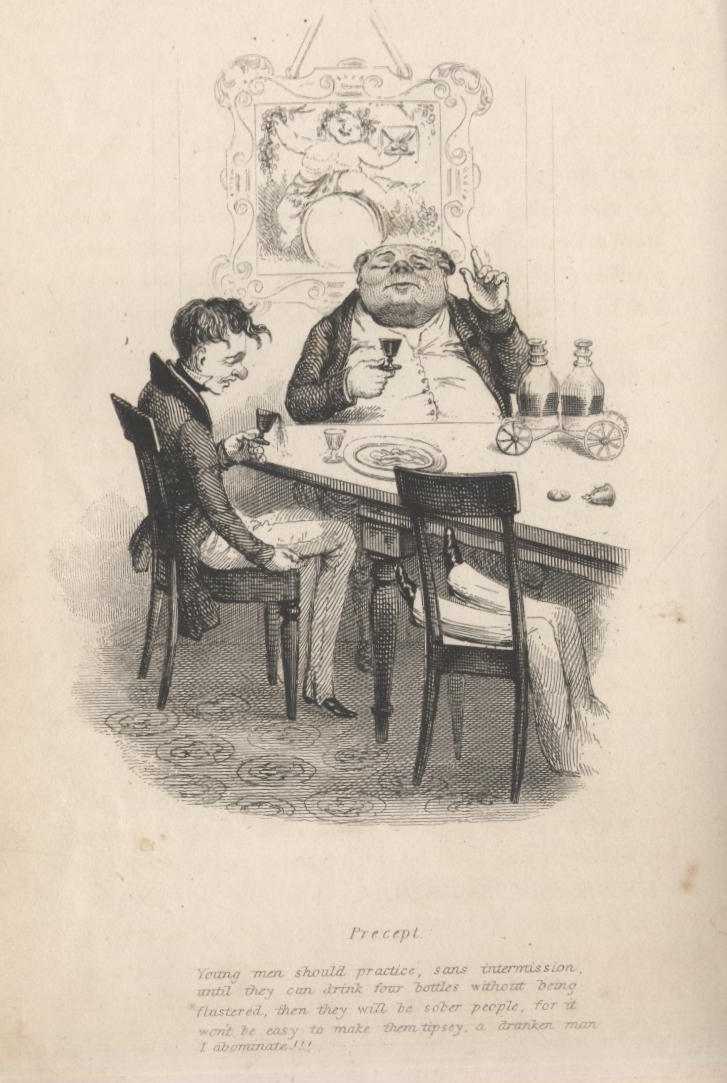
Uncle Samson was a six-bottle man. His capacity was certainly great, whatever might be said of his intellect; for I have seen him rise without the least appearance of elevation, after having swallowed the customary half dozen. He laughed to scorn all modern potations of wishy-washy French and Rhine wines—deeming them unfit for the palate of a true-born Englishman. Port, Sherry, and Madeira were his only tipple—the rest, he would assert, were only fit for finger-glasses!
—He was of a bulky figure, indeed a perfect Magnum among men, with a very apoplectic brevity of neck, and a logwood complexion,—and though a staunch Church-of-England-man, he might have been mistaken, from his predilection for the Port, to be a true Mussulman. To hear him discourse upon the age of his wines—the 'pinhole,' the 'crust,' the 'bees'-wing,' etc., was perfectly edifying—and every man who could not imbibe the prescribed quantum, became his butt. To temperance and tea-total societies he attributed the rapid growth of radicalism and dissent.
"Water," he would say, with a sort of hydrophobic shudder, "is only a fit beverage for asses!"—"To say a man could drink like a fish, was once the greatest encomium that a bon-vivant could bestow upon a brother Bacchanalian—but, alas! in this matter-of-fact and degenerate age, men do so literally—washing their gills with unadulterated water!—Dropsy and water on the chest must be the infallible result! If such an order of things continue, all the puppies in the kingdom, who would perhaps have become jolly dogs in their time, will be drowned! Yes, they'll inevitably founder, like a water-logged vessel, in sight of port. These water-drinkers will not have a long reign. They would feign persuade us that 'Truth lies at the bottom of a well,'—lies, indeed! I tell you Horace knew better, and that his assertion of 'There is truth in wine,' was founded on experience—his draughts had no water-mark in 'em, depend on it."
He was a great buyer of choice "Pieces," and his cellar contained one of the best stocks in the kingdom, both in the wood and bottle. Poor Uncle!—he has now been some years "in the wood" himself, and snugly stowed in the family vault!
Having been attacked with a severe cold, he was compelled to call in the Doctor, who sent him a sudorific in three Lilliputian bottles; but although he received the advice of his medical friend, he followed Shakspeare's,
"Throw physic to the dogs,"
and prescribed for himself a bowl of wine-whey as a febrifuge. His housekeeper remonstrated, but he would have his 'whey,' and he died! leaving a handsome fortune, and two good-looking nephews to follow him to the grave.
Myself and Cousin (the two nephews aforesaid) were vast favourites with the old gentleman, and strenuously did he endeavour to initiate us in the art of drinking, recounting the feats of his youth, and his drinking-bouts with my father, adding, with a smile, "But you'll never be a par with, your Uncle, Ned, till you can carry the six bottles under your waistcoat."
My head was certainly stronger than my Cousin's; he went as far as the third bottle—the next drop was on the floor! Now I did once manage the fourth bottle—but then—I must confess I was obliged to give it up!
"Young men," would my Uncle say, "should practice 'sans intermission,'
until they can drink four bottles without being flustered, then they will
be sober people; for it won't be easy to make them tipsy—a drunken man I
abominate!"
"You see I make no splash!"
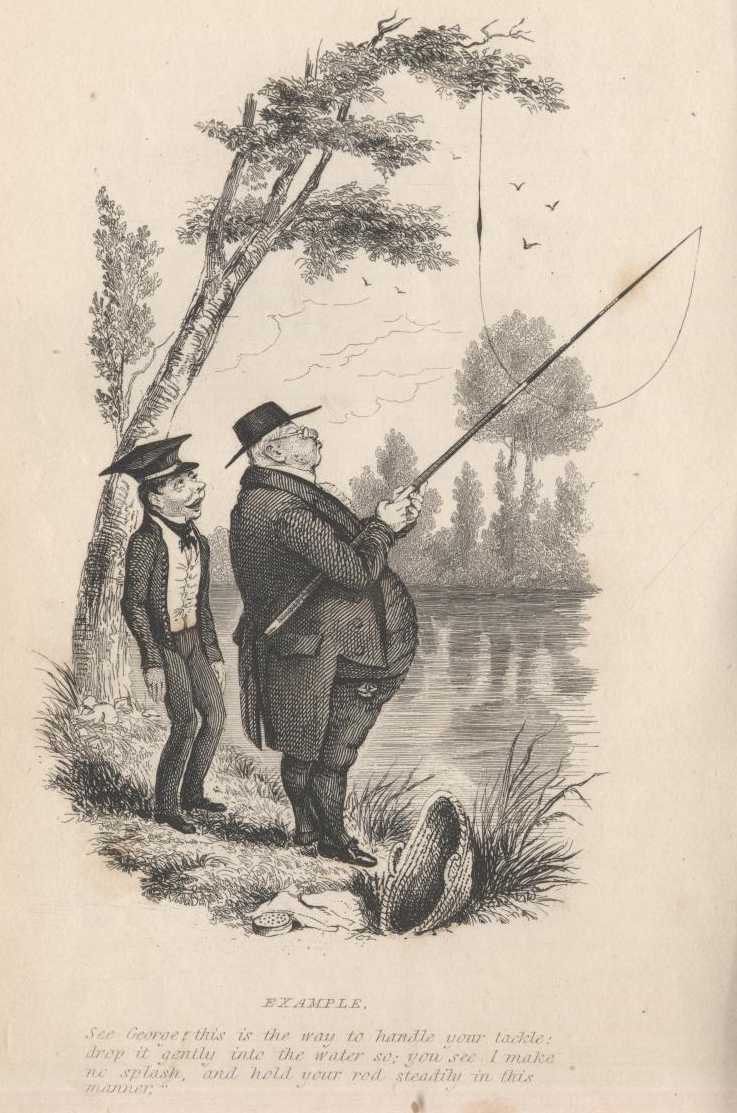
THERE are some individuals so inflated with self-sufficiency, and entertain such an overweaning opinion of their skill in all matters, that they must needs have a finger in every pie.
Perhaps a finer specimen than old V____, of this genius of egotistic, meddling mortals, never existed. He was a man well-to-do in the world, and possessed not only a large fortune, but a large family.
He had an idea that no man was better qualified to bring up his children in the way they should go; and eternally plagued the obsequious tutors of his sons with his novel mode of instilling the rudiments of the Latin tongue, although he knew not a word of the language; and the obedient mistresses of his daughters with his short road to attaining a perfection in playing the piano-forte, without knowing a note of the gamut: but what could they say; why, nothing more or less than they were 'astonished;' which was vague enough to be as true as it was flattering.
And then he was so universally clever, that he even interfered in the culinary department of his household, instructing the red-elbowed, greasy, grinning Cook, in the sublime art of drawing, stuffing, and roasting a goose, for which she certainly did not fail to roast the goose (her master) when she escaped to the regions below.
Even his medical attendant was compelled to acknowledge the efficacy of his domestic prescriptions of water-gruel and honey in catarrhs, and roasted onions in ear-aches, and sundry other simple appliances; and, in fine, found himself, on most occasions, rather a 'consulting surgeon,' than an apothecary, for he was compelled to yield to the man who had studied Buchan's and Graham's Domestic Medicine. And the only consolation he derived from his yielding affability, were the long bills occasioned by the mistakes of this domestic quack, who was continually running into errors, which required all his skill to repair. Nay, his wife's mantua-maker did not escape his tormenting and impertinent advice; for he pretended to a profound knowledge in all the modes, from the time of Elizabeth to Victoria, and deemed his judgment in frills, flounces, and corsages, as undeniable and infallible.
Of course the sempstress flattered his taste; for his wife, poor soul! she soon had tact enough to discover, had no voice in the business.
His eldest son, George, had a notion that he could angle. Old V____ immediately read himself up in Walton, and soon convinced—himself, that he was perfect in that line, and quite capable of teaching the whole art and mystery.
"See, George," said he, when they had arrived at a convenient spot for their first attempt, "this is the way to handle your tackle; drop it gently into the water,—so!" and, twirling the line aloft, he hooked the branches of an overhanging tree!—sagaciously adding, "You see I make no splash! and hold your rod in this manner!"
George was too much afraid of his imperious father, to point out his
error, and old V____ consequently stood in the broiling sun for a full
quarter of an hour, before he discovered that he had caught a birch
instead of a perch!
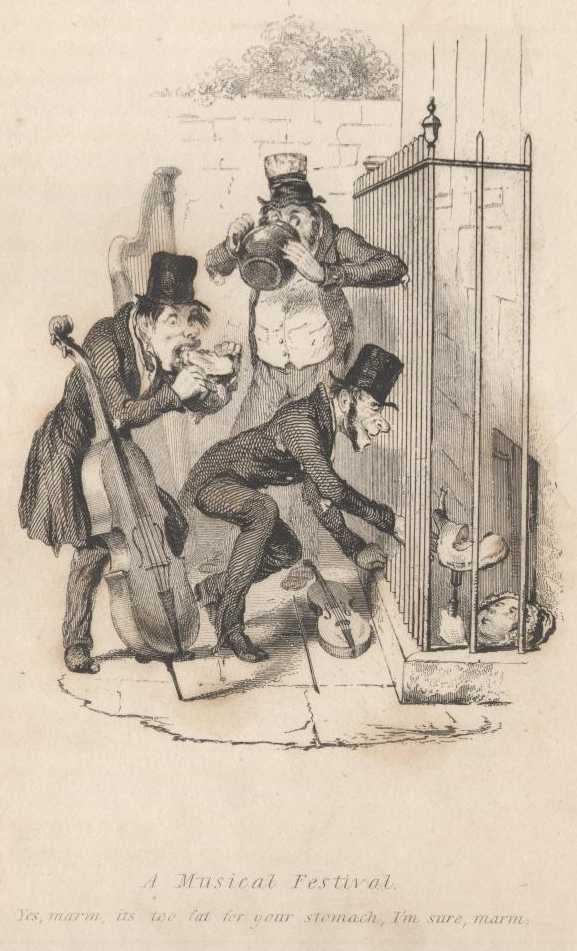
Matter-of-fact people read the story of Orpheus, and imagine that his "charming rocks" and "soothing savage beasts," is a mere fabulous invention. No such thing: it is undoubtedly founded on fact. Nay, we could quote a thousand modern instances of the power of music quite as astonishing.
One most true and extraordinary occurrence will suffice to establish the truth of our proposition beyond a doubt. Molly Scraggs was a cook in a first-rate family, in the most aristocratic quarter of the metropolis.
The master and mistress were abroad, and Molly had nothing to do but to indulge her thoughts; and, buried as she was in the pleasant gloom and quiet of an underground kitchen, nothing could possibly be more favourable to their developement. She was moreover exceedingly plump, tender, and sentimental, and had had a lover, who had proved false to his vows.
In this eligible situation and temper for receiving soft impressions, she sat negligently rocking herself in her chair, and polishing the lid of a copper saucepan! when the sweet, mellifluous strains of an itinerant band struck gently upon the drum of her ear. "Wapping Old Stairs" was distinctly recognized, and she mentally repeated the words so applicable to her bereaved situation.
"Your Molly has never proved false she declares," 'till the tears literally gushed from her "blue, blue orbs," and trickled down her plump and ruddy cheeks; but scarcely had she plunged into the very depths of the pathos induced by the moving air, which threatened to throw her into a gentle swoon, or kicking hysterics, when her spirit was aroused by the sudden change of the melancholy ditty, to the rampant and lively tune, with the popular burden of, "Turn about and wheel about, and jump Jim Crow!"
This certainly excited her feelings; but, strange to say, it made her leap from her chair, exasperated, as it were, by the sudden revulsion, and rush into the area.
"Don't, for goodness sake, play that horrid 'chune,'" said Molly, emphatically addressing the minstrels.
The 'fiddle' immediately put his instrument under his arm, and, touching the brim of his napless hat, scraped a sort of bow, and smilingly asked the cook to name any other tune she preferred.
"Play us," said she, "'Oh! no, we never mention her,' or summat o' that sort; I hate jigs and dances mortally."
"Yes, marm," replied the 'fiddle,' obsequiously; and, whispering the 'harp' and 'bass,' they played the air to her heart's content.
In fact, if one might guess by the agility with which she ran into the kitchen, she was quite melted; and, returning with the remnants of a gooseberry pie and the best part of a shoulder of mutton, she handed them to the musicians.
"Thanky'e, marm, I'm sure," said the 'bass,' sticking his teeth into the pie-crust.
"The mutton 's rayther fat, but it 's sweet, at any rate!"
"Yes, marm," said the 'fiddle;' "it's too fat for your stomach, I'm sure, marm;" and consigned it to his green-baize fiddle-case.
"Now," said Molly,—"play us, 'Drink to me only,' and I'll draw you a mug o' table-ale."
"You're vastly kind," said the 'fiddle;' "it's a pleasure to play anythink for you, marm, you've sich taste;" and then turning to his comrades, he added, with a smile—"By goles! if she ain't the woppingest cretur as ever I set eyes on—"
The tune required was played, and the promised ale discussed. The 'bass,' with a feeling of gratitude, voted that they should give a parting air unsolicited.
"Vot shall it be?" demanded the 'harp.'
"Vy, considering of her size," replied the 'fiddle,' "I thinks as nothink couldn't be more appropriate than:
'Farewell to the mountain !'"
and, striking up, they played the proposed song, marching on well
pleased with the unexpected appreciation of their musical talent by the
kind, and munificent Molly Scraggs!
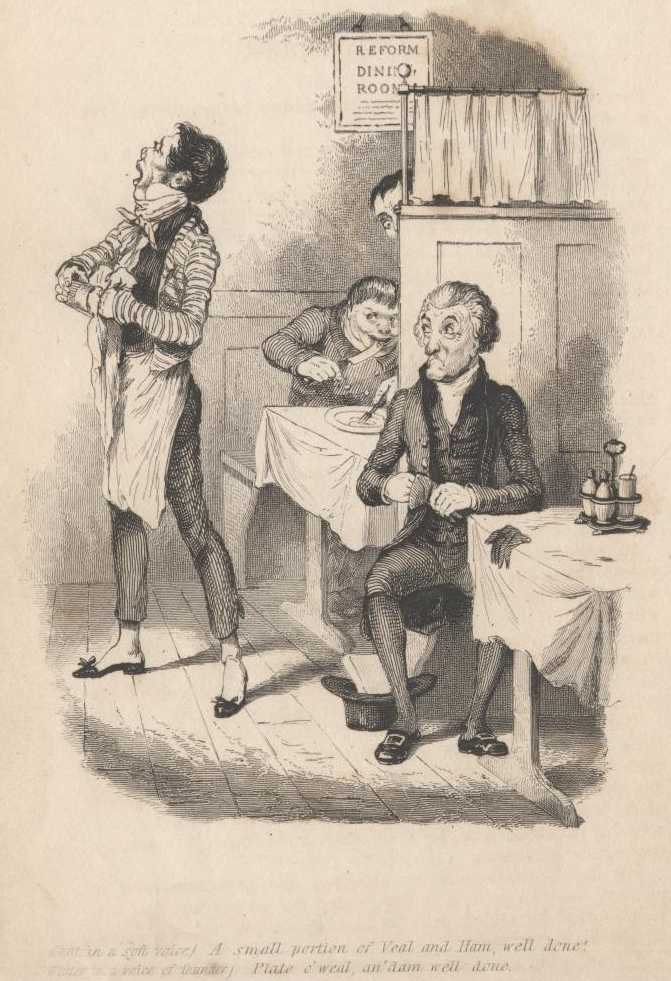
FROM twelve o'clock until four, the eating houses of the City are crammed with hungry clerks.
Bills of fare have not yet been introduced,—the more's the pity; but, in lieu thereof, you are no sooner seated in one of the snug inviting little settles, with a table laid for four or six, spread with a snowy cloth, still bearing the fresh quadrangular marks impressed by the mangle, and rather damp, than the dapper, ubiquitous waiter, napkin in hand, stands before you, and rapidly runs over a detailed account of the tempting viands all smoking hot, and ready to be served up.
"Beef, boiled and roast; veal and ham; line of pork, roast; leg boiled, with pease pudding; cutlets, chops and steaks, greens, taters, and pease," etc. etc.
Some are fastidious, and hesitate; the waiter, whose eyes are 'all about him,' leaves you to meditate and decide, while he hastens to inform a new arrival, and mechanically repeats his catalogue of dainties; and, bawling out at the top of his voice, "One roast beaf and one taters," you echo his words, and he straightway reports your wishes in the same voice and manner to the invisible purveyors below, and ten to one but you get a piece of boiled fat to eke out your roast meat.
In some houses, new and stale bread, at discretion, are provided; and many a stripling, lean and hungry as a greyhound, with a large appetite and a small purse, calls for a small plate, without vegetables, and fills up the craving crannies with an immoderate proportion of the staff of life, while the reckoning simply stands, "one small plate 6d., one bread 1d., one waiter 1d.;" and at this economical price satisfies the demands of his young appetite.
But still, cheap as this appears, he pays it the aggregate, for there are frequently 500 or 600 diners daily at these Establishments; and the waiter, who generally purchases his place, and provides glass, cloths, etc. not only makes a 'good thing of it,' but frequently accumulates sufficient to set up on his own account, in which case, he is almost sure of being followed by the regular customers.
For he is universally so obliging, and possesses such a memory, and an aptness in discovering the various tastes of his visitors, that he seldom fails in making most of the every-day feeders his fast friends.
"Tom, bring me a small plate of boiled beef and potatoes," cries one of his regulars. Placing his hand upon the table-cloth; and knocking off the crumbs with his napkin, he bends to the gentleman, and in a small. confidential voice informs him,
"The beef won't do for you, Sir,—it's too low, it's bin in cut a hour. Fine ribs o' lamb, jist up."
"That will do, Tom," says the gratified customer.
"Grass or spinach, Sir? fine 'grass,'—first this season."
"Bring it, and quick, Tom," replies the gentleman, pleased with the assiduous care he takes in not permitting him to have an indifferent cut of a half cold joint.
The most extraordinary part of the business is, the ready manner in which he 'casts up' all you have eaten, takes the reckoning, and then is off again in a twinkling.
A stranger, and one unaccustomed to feed in public, is recognised in a moment by his uneasy movements. He generally slinks into the nearest vacant seat, and is evidently taken aback by the apparently abrupt and rapid annunciation of the voluble and active waiter, and, in the hurry and confusion, very frequently decides upon the dish least pleasant to his palate.
A respectable gentleman of the old school, of a mild and reverend appearance, and a lean and hungry figure, once dropped into a settle where we were discussing a rump steak and a shallot, tender as an infant, and fragrant as a flower garden! Tom pounced upon him in a moment, and uttered the mystic roll. The worthy senior was evidently confused and startled, but necessity so far overcame his diffidence that he softly said,
"A small portion of veal and ham, well done."
Tom, whirled round, continuing the application of his eternal napkin to a tumbler which he was polishing, bawled out in a stentorian voice,
"Plate o' weal, an' dam well done!"
We shall never sponge from the slate of our memory the utter
astonishment expressed in the bland countenance of the startled old
gentleman at this peculiar echo of his wishes.
"This is a werry lonely spot, Sir; I wonder you ar'n't afeard of being robbed."
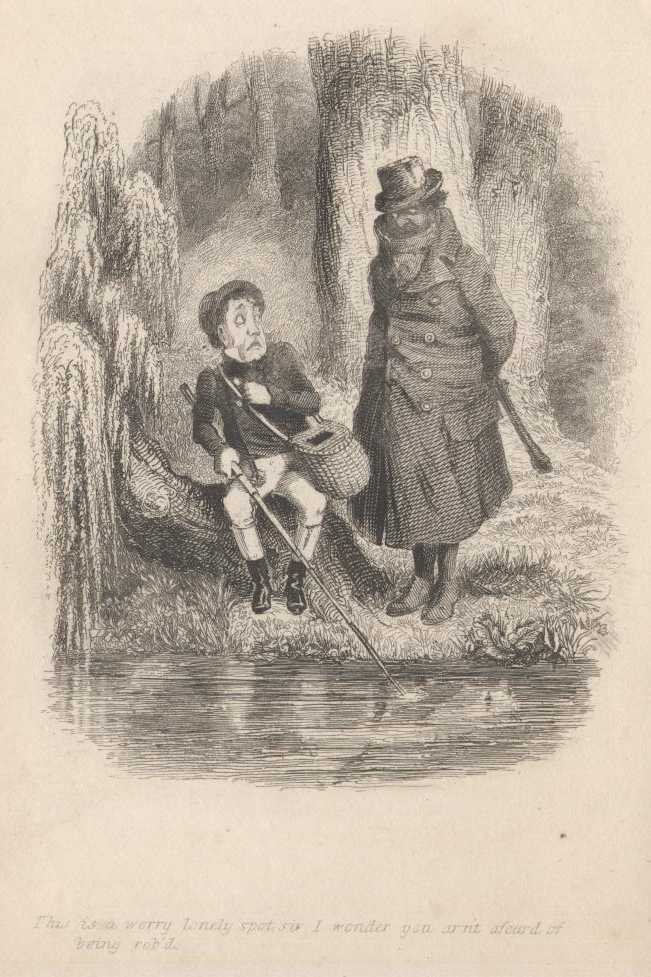
|
JOB Timmins was a tailor bold, And well he knew his trade, And though he was no fighting man Had often dress'd a blade! Quoth he, one day—"I have not had A holiday for years, So I'm resolv'd to go and fish, And cut for once the shears." So donning quick his Sunday's suit, He took both rod and line, And bait for fish—and prog for one, And eke a flask of wine. For he was one who loved to live, And said—"Where'er I roam I like to feed—and though abroad, To make myself at home." Beneath a shady grove of trees He sat him down to fish, And having got a cover, he Long'd much to get a dish. He cast his line, and watch'd his float, Slow gliding down the tide; He saw it sink! he drew it up, And lo! a fish he spied. He took the struggling gudgeon off, And cried—"I likes his looks, I wish he'd live—but fishes die Soon as they're—off the hooks!" At last a dozen more he drew— (Fine-drawing 'twas to him!) But day past by—and twilight came, All objects soon grew dim. "One more!" he cried, "and then I'll pack, And homeward trot to sup,"— But as he spoke, he heard a tread, Which caused him to look up. Poor Timmins trembled as he gazed Upon the stranger's face; For cut purse! robber! all too plain, His eye could therein trace. "Them's werry handsome boots o' yourn," The ruffian smiling cried, "Jist draw your trotters out—my pal— And we'll swop tiles, besides." "That coat too, is a pretty fit— Don't tremble so—for I Von't rob you of a single fish, I've other fish to fry." Poor Timmins was obliged to yield Hat, coat, and boots—in short He was completely stripp'd—and paid Most dearly for his "sport." And as he homeward went, he sigh'd— "Farewell to stream and brook; O! yes, they'll catch me there again A fishing—with a hook!" |
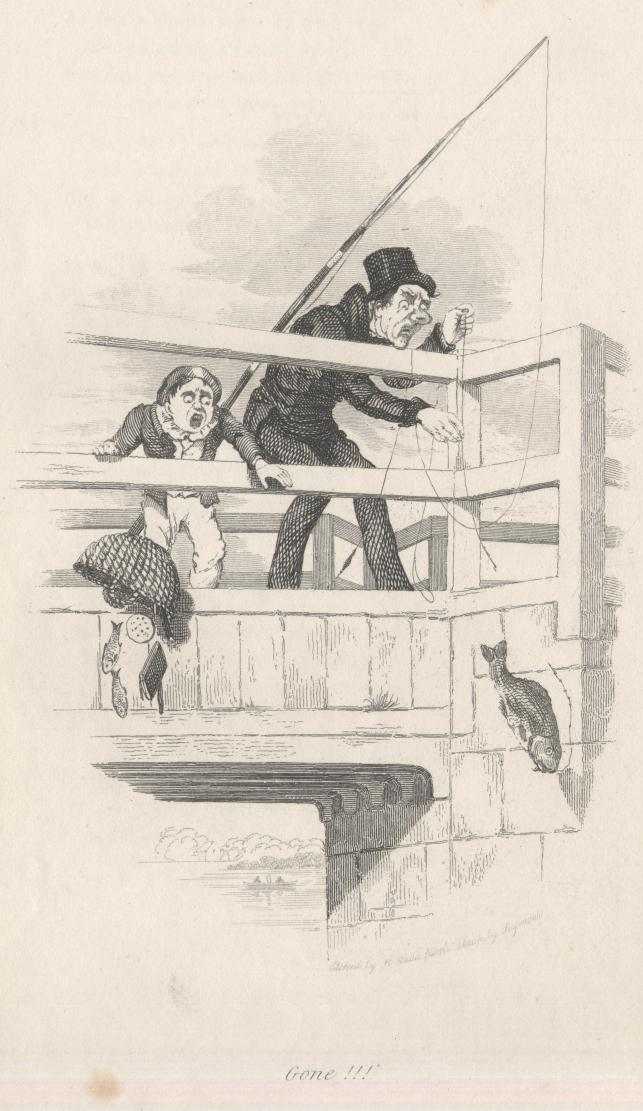
|
ALONG the banks, at early dawn, Trudged Nobbs and Nobbs's son, With rod and line, resolved that day Great fishes should be won. At last they came unto a bridge, Cried Nobbs, "Oh! this is fine!" And feeling sure 'twould answer well, He dropp'd the stream a line. "We cannot find a fitter place, If twenty miles we march; Its very look has fix'd my choice, So knowing and—so arch!" He baited and he cast his line, When soon, to his delight, He saw his float bob up and down, And lo! he had a bite! "A gudgeon, Tom, I think it is!" Cried Nobbs, "Here, take the prize; It weighs a pound—in its own scales, I'm quite sure by its size." He cast again his baited hook, And drew another up! And cried, "We are in luck to-day, How glorious we shall sup!" All in the basket Tommy stow'd The piscatory spoil; Says Nobbs, "We've netted two at least, Albeit we've no toil." Amazed at his own luck, he threw The tempting bait again, And presently a nibble had— A bite! he pull'd amain! His rod beneath the fish's weight Now bent just like a bow, "What's this?" cried Nobbs; his son replied, "A salmon, 'tis, I know." And sure enough a monstrous perch, Of six or seven pounds, He from the water drew, whose bulk Both dad and son confounds. "O! Gemini!" he said, when he "O! Pisces!" should have cried; And tremblingly the wriggling fish Haul'd to the bridge's side. When, lo! just as he stretched his hand To grasp the perch's fin, The slender line was snapp'd in twain, The perch went tumbling in! "Gone! gone! by gosh!" scream'd Nobbs, while Tom Too eager forward bent, And, with a kick, their basket quick Into the river sent. |
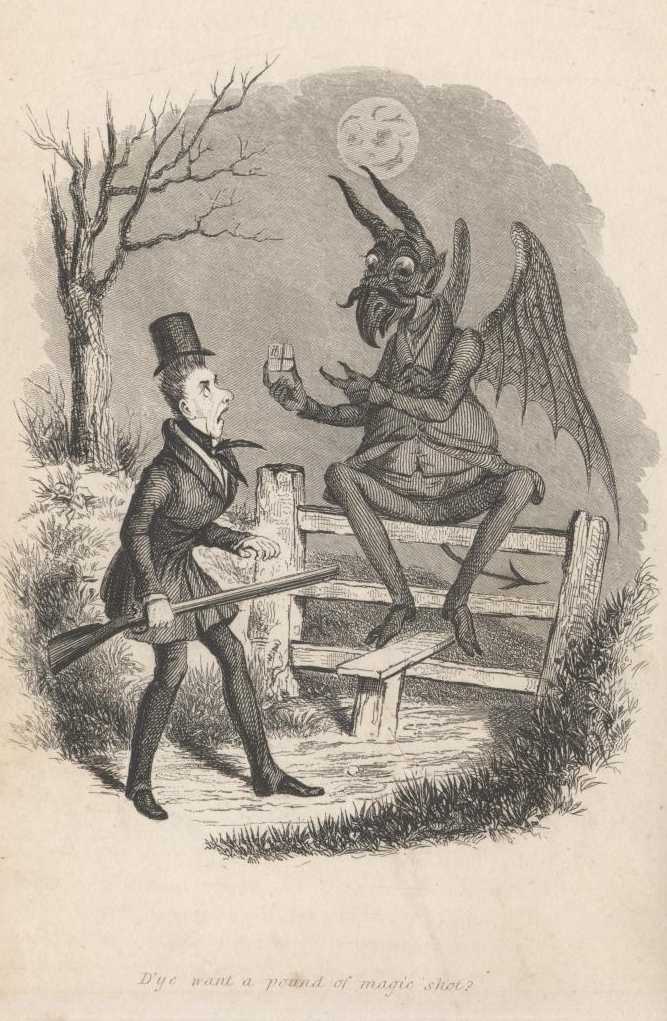
Those wags who are so fond of playing off their jokes upon others, require great skill and foresight to prevent the laugh being turned against themselves.
Jim Smith was an inveterate joker, and his jokes were, for the most part, of the practical kind. He had a valuable tortoiseshell cat, whose beauty was not only the theme of praise with all the old maids in the neighbourhood, but her charms attracted the notice of numerous feline gentlemen dwelling in the vicinity, who were, nocturnally, wont to pay their devoirs by that species of serenades, known under the cacophonous name of caterwauling.
One very ugly Tom, (who, it was whispered abroad, was a great-grandfather, and scandalously notorious for gallantries unbecoming a cat of his age) was particularly obnoxious to our hero; and, in an unlucky moment, he resolved to 'pickle him,' as he facetiously termed it. Now his process of pickling consisted in mixing a portion of prussic acid in milk. Taking the precaution to call in his own pet and favorite, he placed the potion in the accustomed path of her long-whiskered suitor. Tom finding the coast clear slipped his furry body over the wall, and dropped gently as a lady's glove into the garden, and slily smelling the flower-borders, as if he were merely amusing himself in the elegant study of botany, stealthily approached the house, and uttering a low plaintive 'miau,' to attract the attention of his dear Minx, patiently awaited the appearance of his true-love.
Minx heard the voice she loved so well, and hurried to meet her ancient beau. A slight noise, however, alarmed his timidity, and he scaled the wall in a twinkling.
Presently the screams of the maid assured him that 'something had taken place;' and when he heard the words, "Oh! the cat! the cat!" he felt quite certain that the potion had taken effect. He walked deliberately down stairs, and behold! there lay Miss Minx, his own favorite, struggling in the agonies of death, on the parlor rug. The fact is, he had shut the doors, but forgotten that the window was open, and the consequence was, the loss of poor Minx, who had drunk deep of the malignant poison designed for her gallant.
This was only one of a thousand tricks that had miscarried.
Having one day ascertained that his acquaintance, Tom Wilkins, was gone out 'a-shooting,' he determined to way-lay him on his return.
It was a beautiful moonlight night in the latter end of October. Disguising himself in a demoniac mask, a pair of huge wings, and a forked tail, he seated himself on a stile in the sportsman's path.
Anon he espied the weary and unconscious Tom approaching, lost in the profundity of thought, and though not in love, ruminating on every miss he had made in that day's bootless trudge.
He almost, touched the stile before his affrighted gaze encountered this 'goblin damned.'
His short crop bristled up, assuming the stiffness of a penetrating hair brush.
For an instant his whole frame appeared petrified, and the tide and current of his life frozen up in thick-ribbed ice.
Jim Smith, meanwhile, holding out a white packet at arm's length, exclaimed in a sepulchral tone,
"D'ye want a pound of magic shot?"
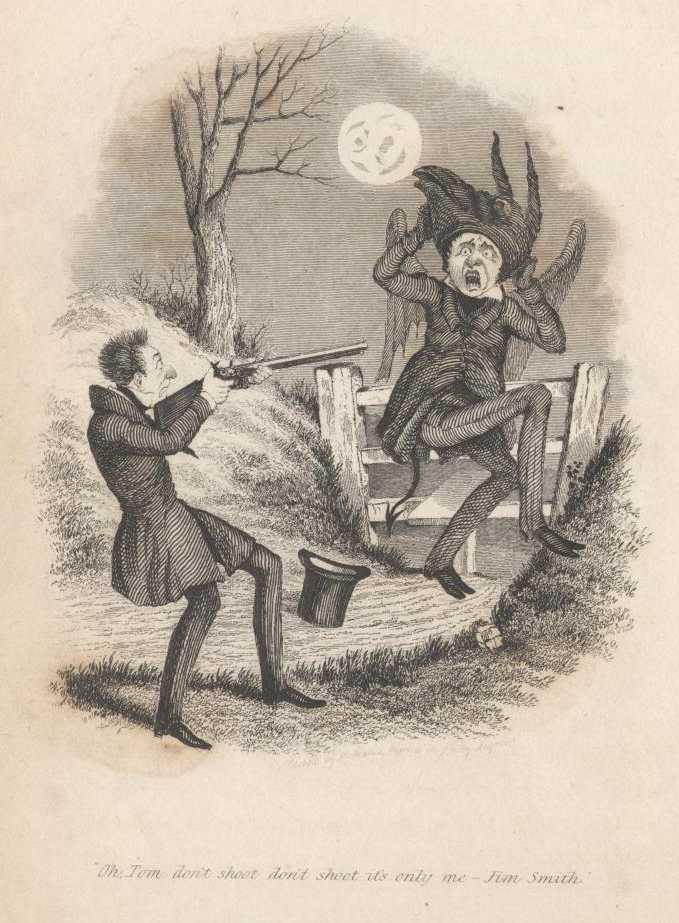
AWFULLY ponderous as the words struck upon the tightened drum of Tom's auriculars, they still tended to arouse his fainting spirit.
"Mer-mer-mercy on us!" ejaculated he, and shrank back a pace or two, still keeping his dilating optics fixed upon the horrible spectre.
"D'ye want a pound of magic shot?" repeated Jim Smith.
"Mur-mur-der!" screamed Tom; and, mechanically raising his gun for action of some kind appeared absolutely necessary to keep life within him, he aimed at the Tempter, trembling in every joint.
Jim, who had as usual never calculated upon such a turning of the tables, threw off his head—his assumed one, of course, and, leaping from the stile, cried aloud—
"Oh! Tom, don't shoot—don't shoot!—it's only me—Jim Smith!"
Down dropped the gun from the sportsman's grasp.
"Oh! you fool! you—you—considerable fool!" cried he, supporting himself on a neighbouring hawthorn, which very kindly and considerately lent him an arm on the occasion. "It's a great mercy—a very great mercy, Jim—as we wasn't both killed!—another minute, only another minute, and—but it won't bear thinking on."
"Forgive me, Tom," said the penitent joker; "I never was so near a corpse afore. If I didn't think the shots were clean through me, and that's flat."
"Sich jokes," said Tom, "is onpardonable, and you must be mad."
"I confess I'm out of my head, Tom," said Jim, who was dangling the huge mask in his hand, and fast recovering from the effects of his fright. "Depend on it, I won't put myself in such a perdicament again, Tom. No, no—no more playing the devil; for, egad! you had liked to have played the devil with me."
"A joke's a joke," sagely remarked Tom, picking up his hat and fowling piece.
"True!" replied Smith; "but, I think, after all, I had the greatest cause for being in a fright. You had the best chance, at any rate; for I could not have harmed you, whereas you might have made a riddle of me."
"Stay, there!" answered Tom; "I can tell you, you had as little cause for fear as I had, you come to that; for the truth is, the deuce a bit of powder or shot either was there in the piece!"
"You don't say so!" said Jim, evidently disappointed and chop-fallen at this discovery of his groundless fears. "Well, I only wish I'd known it, that's all!"—then, cogitating inwardly for a minute, he continued—"but, I say, Tom, you won't mention this little fright of yours?"
"No; but I'll mention the great fright—of Jim Smith—rely upon it,"
said Tom, firmly; and he kept his word so faithfully, that the next day
the whole story was circulated, with many ingenious additions, to the
great annoyance of the practical joker.
"Here we go up—up—up;
And here we go down—down—down."
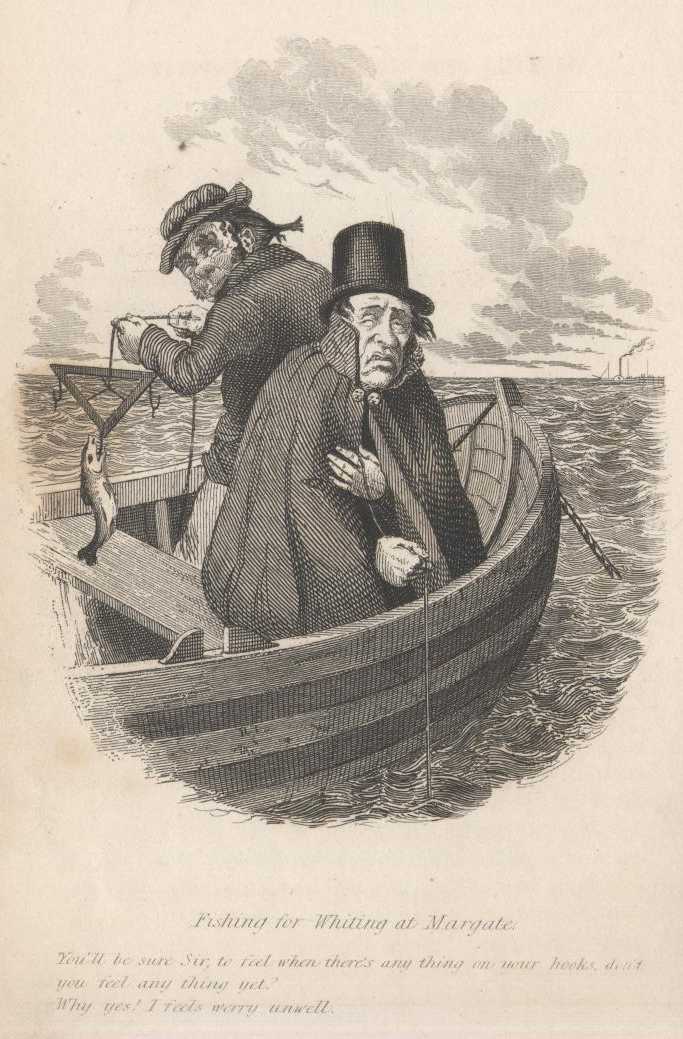
"VARIETY," as Cowper says, "is the very spice of life"—and certainly, at Margate, there is enough, in all conscience, to delight the most fastidious of pleasure-hunters.
There sailors ply for passengers for a trip in their pleasure boats, setting forth all the tempting delights of a fine breeze—and woe-betide the unfortunate cockney who gets in the clutches of a pair of plyers of this sort, for he becomes as fixed as if he were actually in a vice, frequently making a virtue of necessity, and stepping on board, when he had much better stroll on land.
Away he goes, on the wings of the wind, like—a gull! Should he be a knave, it may probably be of infinite service to society, for he is likely ever afterwards to forswear craft of any kind!
Donkies too abound, as they do in most watering placesand, oh! what a many asses have we seen mounted, trotting along the beach and cliffs!
The insinuating address of the boatmen is, however, irresistible; and if they cannot induce you to make a sail to catch the wind, they will set forth, in all the glowing colors of a dying dolphin, the pleasurable sport of catching fish!
They tell you of a gentleman, who, "the other day, pulled up, in a single hour, I don't know how many fish, weighing I don't know how much." And thus baited, some unwise gentleman unfortunately nibbles, and he is caught. A bargain is struck, 'the boat is on the shore,' the lines and hooks are displayed, and the victim steps in, scarcely conscious of what he is about, but full well knowing that he is going to sea!
They put out to sea, and casting their baited hooks, the experienced fisherman soon pulls up a fine lively whiting.
"Ecod!" exclaims the cockney, with dilated optics, "this is fine—why that 'ere fish is worth a matter of a shilling in London—Do tell me how you cotched him."
"With a hook!" replied the boatman.
"To be sure you did—but why did'nt he bite mine?"
"'Cause he came t'other side, I s'pose."
"Vell, let me try that side then," cries the tyro, and carefully changes his position.—"Dear me, this here boat o'yourn wobbles about rayther, mister."
"Nothing, sir, at all; it's only the motion of the water."
"I don't like it, tho'; I can tell you, it makes me feel all over somehow."
"It will go off, sir, in time; there's another," and he pulls in another wriggling fish, and casts him at the bottom of the boat. "Well, that's plaguey tiresome, any how—two! and I've cotched nothin' yet—how do you do it?"
"Just so—throw in your hook, and bide a bit—and you'll be sure, sir, to feel when there's any thing on your hook; don't you feel any thing yet?"
"Why, yes, I feels werry unwell!" cries the landsman; and, bringing up his hook and bait, requests the good-natured boatman to pull for shore, 'like vinkin,'—which request; the obliging fellow immediately complies with, having agreeably fished at the expense of his fare; and, landing his whitings and the flat, laughs in his sleeve at the qualms of his customer.
But there is always an abundant crop of such fools as he, who pretend
to dabble in a science, in utter ignorance of the elements; while, like
Jason of old, the wily boatman finds a sheep with a golden fleece,—
although his brains are always too much on the alert to be what is
technically termed—wool-gathering. Some people are desirous of seeing
every thing; and many landsmen have yet to learn, that they may see a
deal, without being a-board!
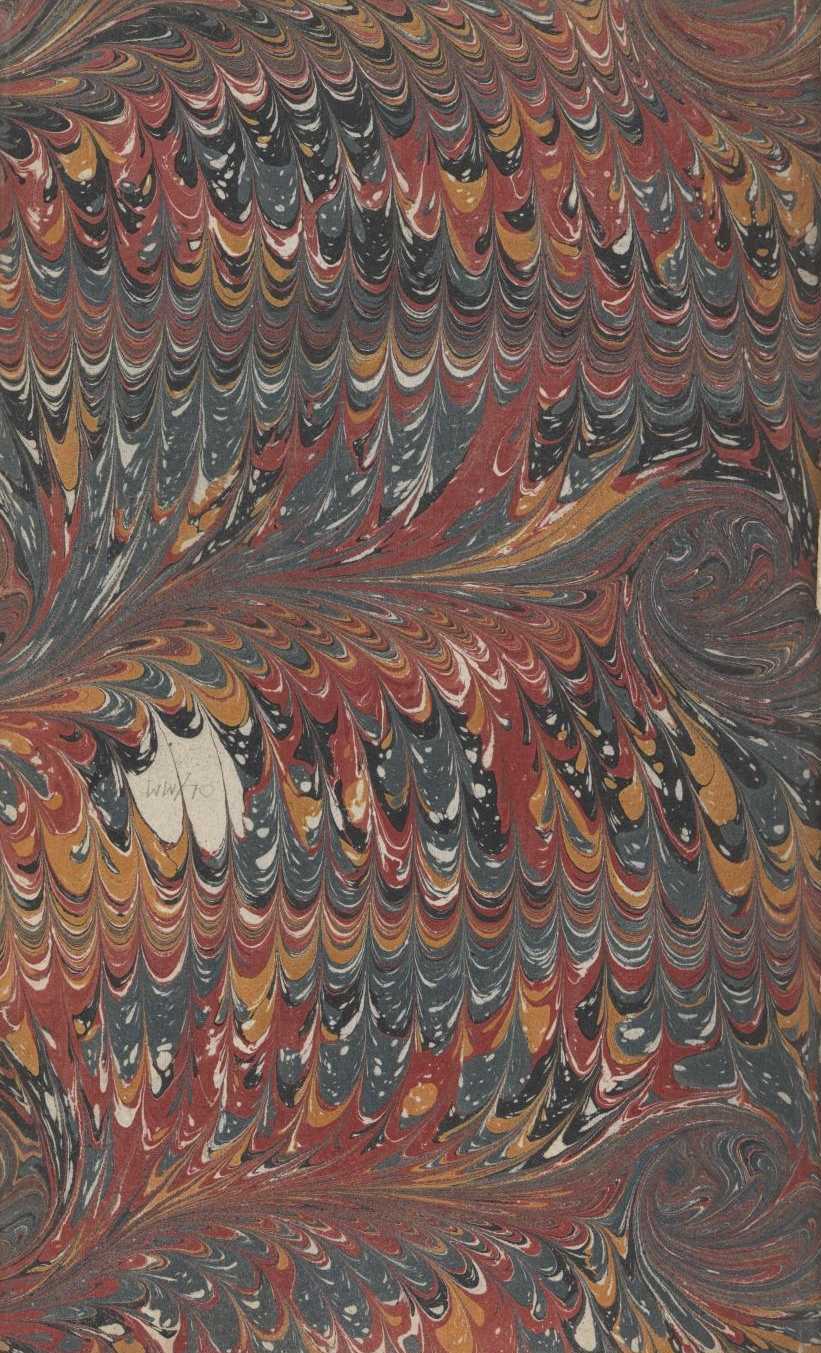
End of the Project Gutenberg EBook of The Sketches of Seymour (Illustrated),
Part 4., by Robert Seymour
*** END OF THIS PROJECT GUTENBERG EBOOK SKETCHES OF SEYMOUR ***
***** This file should be named 5648-h.htm or 5648-h.zip *****
This and all associated files of various formats will be found in:
http://www.gutenberg.net/5/6/4/5648/
Produced by David Widger
Updated editions will replace the previous one--the old editions
will be renamed.
Creating the works from public domain print editions means that no
one owns a United States copyright in these works, so the Foundation
(and you!) can copy and distribute it in the United States without
permission and without paying copyright royalties. Special rules,
set forth in the General Terms of Use part of this license, apply to
copying and distributing Project Gutenberg-tm electronic works to
protect the PROJECT GUTENBERG-tm concept and trademark. Project
Gutenberg is a registered trademark, and may not be used if you
charge for the eBooks, unless you receive specific permission. If you
do not charge anything for copies of this eBook, complying with the
rules is very easy. You may use this eBook for nearly any purpose
such as creation of derivative works, reports, performances and
research. They may be modified and printed and given away--you may do
practically ANYTHING with public domain eBooks. Redistribution is
subject to the trademark license, especially commercial
redistribution.
*** START: FULL LICENSE ***
THE FULL PROJECT GUTENBERG LICENSE
PLEASE READ THIS BEFORE YOU DISTRIBUTE OR USE THIS WORK
To protect the Project Gutenberg-tm mission of promoting the free
distribution of electronic works, by using or distributing this work
(or any other work associated in any way with the phrase "Project
Gutenberg"), you agree to comply with all the terms of the Full Project
Gutenberg-tm License (available with this file or online at
http://gutenberg.net/license).
Section 1. General Terms of Use and Redistributing Project Gutenberg-tm
electronic works
1.A. By reading or using any part of this Project Gutenberg-tm
electronic work, you indicate that you have read, understand, agree to
and accept all the terms of this license and intellectual property
(trademark/copyright) agreement. If you do not agree to abide by all
the terms of this agreement, you must cease using and return or destroy
all copies of Project Gutenberg-tm electronic works in your possession.
If you paid a fee for obtaining a copy of or access to a Project
Gutenberg-tm electronic work and you do not agree to be bound by the
terms of this agreement, you may obtain a refund from the person or
entity to whom you paid the fee as set forth in paragraph 1.E.8.
1.B. "Project Gutenberg" is a registered trademark. It may only be
used on or associated in any way with an electronic work by people who
agree to be bound by the terms of this agreement. There are a few
things that you can do with most Project Gutenberg-tm electronic works
even without complying with the full terms of this agreement. See
paragraph 1.C below. There are a lot of things you can do with Project
Gutenberg-tm electronic works if you follow the terms of this agreement
and help preserve free future access to Project Gutenberg-tm electronic
works. See paragraph 1.E below.
1.C. The Project Gutenberg Literary Archive Foundation ("the Foundation"
or PGLAF), owns a compilation copyright in the collection of Project
Gutenberg-tm electronic works. Nearly all the individual works in the
collection are in the public domain in the United States. If an
individual work is in the public domain in the United States and you are
located in the United States, we do not claim a right to prevent you from
copying, distributing, performing, displaying or creating derivative
works based on the work as long as all references to Project Gutenberg
are removed. Of course, we hope that you will support the Project
Gutenberg-tm mission of promoting free access to electronic works by
freely sharing Project Gutenberg-tm works in compliance with the terms of
this agreement for keeping the Project Gutenberg-tm name associated with
the work. You can easily comply with the terms of this agreement by
keeping this work in the same format with its attached full Project
Gutenberg-tm License when you share it without charge with others.
1.D. The copyright laws of the place where you are located also govern
what you can do with this work. Copyright laws in most countries are in
a constant state of change. If you are outside the United States, check
the laws of your country in addition to the terms of this agreement
before downloading, copying, displaying, performing, distributing or
creating derivative works based on this work or any other Project
Gutenberg-tm work. The Foundation makes no representations concerning
the copyright status of any work in any country outside the United
States.
1.E. Unless you have removed all references to Project Gutenberg:
1.E.1. The following sentence, with active links to, or other immediate
access to, the full Project Gutenberg-tm License must appear prominently
whenever any copy of a Project Gutenberg-tm work (any work on which the
phrase "Project Gutenberg" appears, or with which the phrase "Project
Gutenberg" is associated) is accessed, displayed, performed, viewed,
copied or distributed:
This eBook is for the use of anyone anywhere at no cost and with
almost no restrictions whatsoever. You may copy it, give it away or
re-use it under the terms of the Project Gutenberg License included
with this eBook or online at www.gutenberg.net
1.E.2. If an individual Project Gutenberg-tm electronic work is derived
from the public domain (does not contain a notice indicating that it is
posted with permission of the copyright holder), the work can be copied
and distributed to anyone in the United States without paying any fees
or charges. If you are redistributing or providing access to a work
with the phrase "Project Gutenberg" associated with or appearing on the
work, you must comply either with the requirements of paragraphs 1.E.1
through 1.E.7 or obtain permission for the use of the work and the
Project Gutenberg-tm trademark as set forth in paragraphs 1.E.8 or
1.E.9.
1.E.3. If an individual Project Gutenberg-tm electronic work is posted
with the permission of the copyright holder, your use and distribution
must comply with both paragraphs 1.E.1 through 1.E.7 and any additional
terms imposed by the copyright holder. Additional terms will be linked
to the Project Gutenberg-tm License for all works posted with the
permission of the copyright holder found at the beginning of this work.
1.E.4. Do not unlink or detach or remove the full Project Gutenberg-tm
License terms from this work, or any files containing a part of this
work or any other work associated with Project Gutenberg-tm.
1.E.5. Do not copy, display, perform, distribute or redistribute this
electronic work, or any part of this electronic work, without
prominently displaying the sentence set forth in paragraph 1.E.1 with
active links or immediate access to the full terms of the Project
Gutenberg-tm License.
1.E.6. You may convert to and distribute this work in any binary,
compressed, marked up, nonproprietary or proprietary form, including any
word processing or hypertext form. However, if you provide access to or
distribute copies of a Project Gutenberg-tm work in a format other than
"Plain Vanilla ASCII" or other format used in the official version
posted on the official Project Gutenberg-tm web site (www.gutenberg.net),
you must, at no additional cost, fee or expense to the user, provide a
copy, a means of exporting a copy, or a means of obtaining a copy upon
request, of the work in its original "Plain Vanilla ASCII" or other
form. Any alternate format must include the full Project Gutenberg-tm
License as specified in paragraph 1.E.1.
1.E.7. Do not charge a fee for access to, viewing, displaying,
performing, copying or distributing any Project Gutenberg-tm works
unless you comply with paragraph 1.E.8 or 1.E.9.
1.E.8. You may charge a reasonable fee for copies of or providing
access to or distributing Project Gutenberg-tm electronic works provided
that
- You pay a royalty fee of 20% of the gross profits you derive from
the use of Project Gutenberg-tm works calculated using the method
you already use to calculate your applicable taxes. The fee is
owed to the owner of the Project Gutenberg-tm trademark, but he
has agreed to donate royalties under this paragraph to the
Project Gutenberg Literary Archive Foundation. Royalty payments
must be paid within 60 days following each date on which you
prepare (or are legally required to prepare) your periodic tax
returns. Royalty payments should be clearly marked as such and
sent to the Project Gutenberg Literary Archive Foundation at the
address specified in Section 4, "Information about donations to
the Project Gutenberg Literary Archive Foundation."
- You provide a full refund of any money paid by a user who notifies
you in writing (or by e-mail) within 30 days of receipt that s/he
does not agree to the terms of the full Project Gutenberg-tm
License. You must require such a user to return or
destroy all copies of the works possessed in a physical medium
and discontinue all use of and all access to other copies of
Project Gutenberg-tm works.
- You provide, in accordance with paragraph 1.F.3, a full refund of any
money paid for a work or a replacement copy, if a defect in the
electronic work is discovered and reported to you within 90 days
of receipt of the work.
- You comply with all other terms of this agreement for free
distribution of Project Gutenberg-tm works.
1.E.9. If you wish to charge a fee or distribute a Project Gutenberg-tm
electronic work or group of works on different terms than are set
forth in this agreement, you must obtain permission in writing from
both the Project Gutenberg Literary Archive Foundation and Michael
Hart, the owner of the Project Gutenberg-tm trademark. Contact the
Foundation as set forth in Section 3 below.
1.F.
1.F.1. Project Gutenberg volunteers and employees expend considerable
effort to identify, do copyright research on, transcribe and proofread
public domain works in creating the Project Gutenberg-tm
collection. Despite these efforts, Project Gutenberg-tm electronic
works, and the medium on which they may be stored, may contain
"Defects," such as, but not limited to, incomplete, inaccurate or
corrupt data, transcription errors, a copyright or other intellectual
property infringement, a defective or damaged disk or other medium, a
computer virus, or computer codes that damage or cannot be read by
your equipment.
1.F.2. LIMITED WARRANTY, DISCLAIMER OF DAMAGES - Except for the "Right
of Replacement or Refund" described in paragraph 1.F.3, the Project
Gutenberg Literary Archive Foundation, the owner of the Project
Gutenberg-tm trademark, and any other party distributing a Project
Gutenberg-tm electronic work under this agreement, disclaim all
liability to you for damages, costs and expenses, including legal
fees. YOU AGREE THAT YOU HAVE NO REMEDIES FOR NEGLIGENCE, STRICT
LIABILITY, BREACH OF WARRANTY OR BREACH OF CONTRACT EXCEPT THOSE
PROVIDED IN PARAGRAPH F3. YOU AGREE THAT THE FOUNDATION, THE
TRADEMARK OWNER, AND ANY DISTRIBUTOR UNDER THIS AGREEMENT WILL NOT BE
LIABLE TO YOU FOR ACTUAL, DIRECT, INDIRECT, CONSEQUENTIAL, PUNITIVE OR
INCIDENTAL DAMAGES EVEN IF YOU GIVE NOTICE OF THE POSSIBILITY OF SUCH
DAMAGE.
1.F.3. LIMITED RIGHT OF REPLACEMENT OR REFUND - If you discover a
defect in this electronic work within 90 days of receiving it, you can
receive a refund of the money (if any) you paid for it by sending a
written explanation to the person you received the work from. If you
received the work on a physical medium, you must return the medium with
your written explanation. The person or entity that provided you with
the defective work may elect to provide a replacement copy in lieu of a
refund. If you received the work electronically, the person or entity
providing it to you may choose to give you a second opportunity to
receive the work electronically in lieu of a refund. If the second copy
is also defective, you may demand a refund in writing without further
opportunities to fix the problem.
1.F.4. Except for the limited right of replacement or refund set forth
in paragraph 1.F.3, this work is provided to you 'AS-IS' WITH NO OTHER
WARRANTIES OF ANY KIND, EXPRESS OR IMPLIED, INCLUDING BUT NOT LIMITED TO
WARRANTIES OF MERCHANTIBILITY OR FITNESS FOR ANY PURPOSE.
1.F.5. Some states do not allow disclaimers of certain implied
warranties or the exclusion or limitation of certain types of damages.
If any disclaimer or limitation set forth in this agreement violates the
law of the state applicable to this agreement, the agreement shall be
interpreted to make the maximum disclaimer or limitation permitted by
the applicable state law. The invalidity or unenforceability of any
provision of this agreement shall not void the remaining provisions.
1.F.6. INDEMNITY - You agree to indemnify and hold the Foundation, the
trademark owner, any agent or employee of the Foundation, anyone
providing copies of Project Gutenberg-tm electronic works in accordance
with this agreement, and any volunteers associated with the production,
promotion and distribution of Project Gutenberg-tm electronic works,
harmless from all liability, costs and expenses, including legal fees,
that arise directly or indirectly from any of the following which you do
or cause to occur: (a) distribution of this or any Project Gutenberg-tm
work, (b) alteration, modification, or additions or deletions to any
Project Gutenberg-tm work, and (c) any Defect you cause.
Section 2. Information about the Mission of Project Gutenberg-tm
Project Gutenberg-tm is synonymous with the free distribution of
electronic works in formats readable by the widest variety of computers
including obsolete, old, middle-aged and new computers. It exists
because of the efforts of hundreds of volunteers and donations from
people in all walks of life.
Volunteers and financial support to provide volunteers with the
assistance they need, is critical to reaching Project Gutenberg-tm's
goals and ensuring that the Project Gutenberg-tm collection will
remain freely available for generations to come. In 2001, the Project
Gutenberg Literary Archive Foundation was created to provide a secure
and permanent future for Project Gutenberg-tm and future generations.
To learn more about the Project Gutenberg Literary Archive Foundation
and how your efforts and donations can help, see Sections 3 and 4
and the Foundation web page at http://www.pglaf.org.
Section 3. Information about the Project Gutenberg Literary Archive
Foundation
The Project Gutenberg Literary Archive Foundation is a non profit
501(c)(3) educational corporation organized under the laws of the
state of Mississippi and granted tax exempt status by the Internal
Revenue Service. The Foundation's EIN or federal tax identification
number is 64-6221541. Its 501(c)(3) letter is posted at
http://pglaf.org/fundraising. Contributions to the Project Gutenberg
Literary Archive Foundation are tax deductible to the full extent
permitted by U.S. federal laws and your state's laws.
The Foundation's principal office is located at 4557 Melan Dr. S.
Fairbanks, AK, 99712., but its volunteers and employees are scattered
throughout numerous locations. Its business office is located at
809 North 1500 West, Salt Lake City, UT 84116, (801) 596-1887, email
business@pglaf.org. Email contact links and up to date contact
information can be found at the Foundation's web site and official
page at http://pglaf.org
For additional contact information:
Dr. Gregory B. Newby
Chief Executive and Director
gbnewby@pglaf.org
Section 4. Information about Donations to the Project Gutenberg
Literary Archive Foundation
Project Gutenberg-tm depends upon and cannot survive without wide
spread public support and donations to carry out its mission of
increasing the number of public domain and licensed works that can be
freely distributed in machine readable form accessible by the widest
array of equipment including outdated equipment. Many small donations
($1 to $5,000) are particularly important to maintaining tax exempt
status with the IRS.
The Foundation is committed to complying with the laws regulating
charities and charitable donations in all 50 states of the United
States. Compliance requirements are not uniform and it takes a
considerable effort, much paperwork and many fees to meet and keep up
with these requirements. We do not solicit donations in locations
where we have not received written confirmation of compliance. To
SEND DONATIONS or determine the status of compliance for any
particular state visit http://pglaf.org
While we cannot and do not solicit contributions from states where we
have not met the solicitation requirements, we know of no prohibition
against accepting unsolicited donations from donors in such states who
approach us with offers to donate.
International donations are gratefully accepted, but we cannot make
any statements concerning tax treatment of donations received from
outside the United States. U.S. laws alone swamp our small staff.
Please check the Project Gutenberg Web pages for current donation
methods and addresses. Donations are accepted in a number of other
ways including including checks, online payments and credit card
donations. To donate, please visit: http://pglaf.org/donate
Section 5. General Information About Project Gutenberg-tm electronic
works.
Professor Michael S. Hart is the originator of the Project Gutenberg-tm
concept of a library of electronic works that could be freely shared
with anyone. For thirty years, he produced and distributed Project
Gutenberg-tm eBooks with only a loose network of volunteer support.
Project Gutenberg-tm eBooks are often created from several printed
editions, all of which are confirmed as Public Domain in the U.S.
unless a copyright notice is included. Thus, we do not necessarily
keep eBooks in compliance with any particular paper edition.
Most people start at our Web site which has the main PG search facility:
http://www.gutenberg.net
This Web site includes information about Project Gutenberg-tm,
including how to make donations to the Project Gutenberg Literary
Archive Foundation, how to help produce our new eBooks, and how to
subscribe to our email newsletter to hear about new eBooks.